News & Events
-

NextCOMP News
Welcome to the News, more about composites than the typical day-to-day but full of interesting bits. We try to add bits as they happen so please visit often for the latest information and any up-and-coming guest lectures.
-
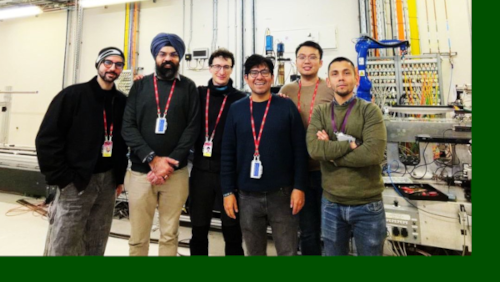
Shine like a Diamond 💎
Gustavo Quino (Imperial, UK) headed up an International Team including Fernando Alvarez-Borges (University of Southampton and Diamond Light Source, UK), Gursahib Singh Bhatia (Trinity College Dublin, Ireland), Torquato Garulli (University of Girona, Spain), Bohao Zhang (University of Bristol, UK), and Kostas Menegos (Imperial, UK) who visited the Diamond Light Source for synchrotron beamtime on the I13 in January 2026. This brought together the NXCT (X-ray Computed Tomography at University of Manchester, UK), muvis (µ-VIS X-Ray Imaging Centre at University of Southampton, UK) and NextCOMP Team to carry out some exiting experiments related to the compressive strength of composites. Stay tuned for the latest results likely to be coming in the 2026 Summer!
-
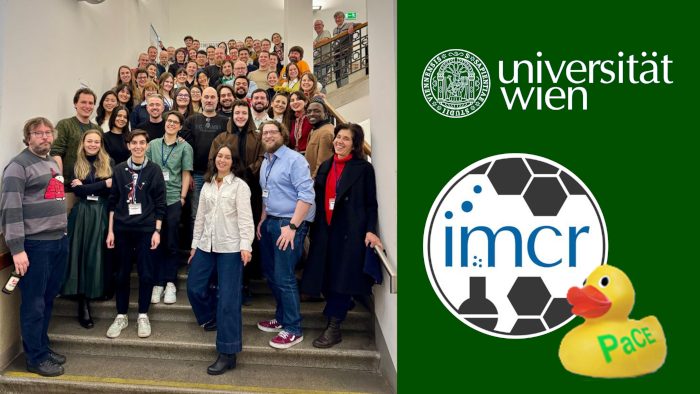
NextCOMP at the X International PaCE X-mas Symposium
The International PaCE X-mas Symposium hit double digits this year welcoming in it's 10th birthday! Hosts Alexander Bismarck and Robert Woodward (University of Vienna, Austria) brought together a wide range of speakers on topics from fungal furniture, composites and materials, to theoretical physics for the day and half event over the 7th and 8th December 2025. Pints of Science opened the proceedings with Dave Anthony (Imperial, UK) talking about “Carbon fibres - how do they (really) fail in compression?” as part of the now traditional extended session this year featuring Eero Kontturi (Aalto University, Finland), Mitchell Jones (University of Vienna, Austria), and Joe Dale (University of Vienna, Austria). Fellow NextCOMP Team Member Stephen Eichhorn (University of Bristol, UK) presented on the topic "Christmas Cellulose and some Gold with a Bang!" on a full second day with; Wenyang Xu (Max Planck Institute of Colloids and Interfaces, Germany), Robert Dawson (University of Sheffield, UK), Kristiina Oksman (Luleå University of Technology, Sweden), Sven Rinke (SimCorp, Austria), Beate Krause (IPF, Germany), Leif Asp (Chalmers University of Technology, Sweden), Barbara Imhof (University of Innsbruck, Austria), Tom Hasell (University of Liverpool, UK), Tom McDonald (The University of Manchester, UK), Wim Thielemans (KU Leuven, Belgium), Aida Naghilou (Medical University of Vienna, Austria), Hande Barkan Öztürk (Octapharma, Austria), Neptun Yousefi (Imperial, UK), and Thad Maloney (Aalto University, Finland). Thanks to Sebastian Hummer, Anastasiia Naryshkina, and Johannes Theiner from the Institute of Materials Chemistry, University of Vienna for their great organisation.
-
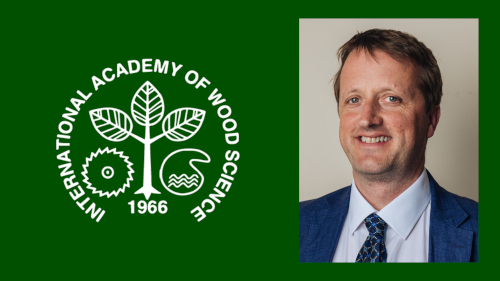
Steve rounds off the year by becoming a fellow of IAWS
We would like to congratulate Steve Eichhorn who has been awarded a fellowship of the International Academy of Wood Science (IAWS) recognising his leadership and impact in materials science and composites research. This is Steve's third fellowship this year adding to his recognition from the Royal Academy of Engineering and American Chemical Society.
-
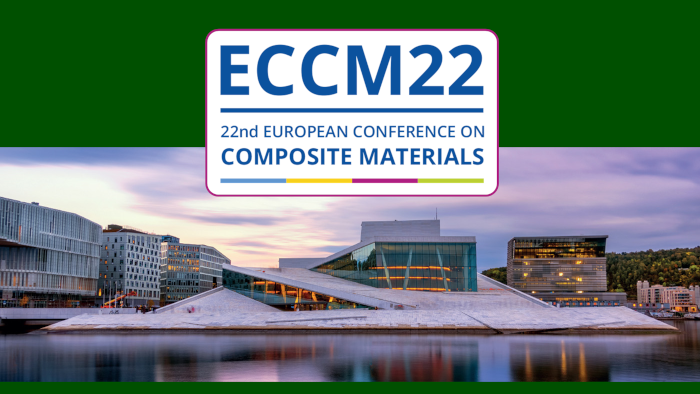
NextCOMP Organising Special Session @ ECCM22
NextCOMP are glad to announce that we will be organising a special session at next year’s 22nd European Conference on Composite Materials (ECCM22). We have expanded our organizing committee to include Frédéric Laurin (ONERA) and Lars Pilgaard Mikkelsen (DTU) as well as the previous NextCOMP Team. Together we will organise a special invitation-only special session on the topic “Understanding and improving longitudinal compressive strength”.
ECCM22 will be held in Oslo, Norway between 21st and 25th June 2026 and we are looking forward to showing off the final work from NextCOMP as it will be just a few days before the end of the project!
-
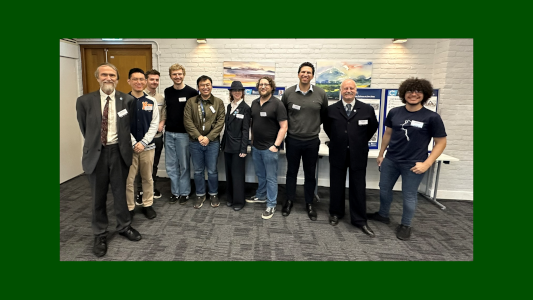
NextCOMP repesented at the Composites Innovation Forum 2025
The NextCOMP Team were out in force at the Composites Innovation Forum 2025 held at the Wills Hall Conference Centre in Bristol on 12th November, and organised jointly by Bristol Composites Institute (BCI) and National Composite Centre (NCC). The Team included Milo (not included in the photograph), Michael, Ian, Dave, Laura, Bohao, Cameron, Bruno, Joe, Kasper, and Yanhao. The event brought together industry leaders and policy experts as well as academics who showcased their developments in innovation for composite materials produced in the UK. More notably, the link between how these innovations are connected and add increased value from UK investment. In turn, Catapults such as the National Composite Centre (NCC) and Royce foster these innvoations by helping to increase the Technology Readiness Levels (TRLs) for Industry uptake. It was an opportunity to see how industry approaches the use of composite materials and how policy and competing requirements forms the basis of their product development and implementation.
Bohao and Laura presented their latest work as part of the poster session and there were ample opportunities for networking. It was great to see the latest news about new facilities coming on-line in the near future which will help to maintain the UK status as a leader in composite innovation.
-
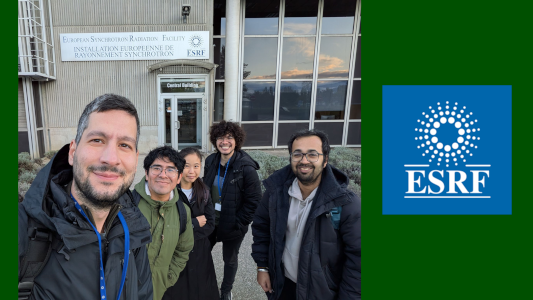
NextCOMP + Beamtime at ESRF
A great Team effort from all those involved in the in-situ experiments using the ID-19 Microtomography Beamline at the European Synchrotron Radiation Facility (ESRF) in Grenoble. A collaboration between Imperial with NextCOMP members Gursahib, Gustavo, Dimitris, Hwei Linn, Bruno, Soraia, Emile, and Silvester working with Anirudh Kohli and Philip Withers from The University of Manchester, and the experts Tayyaba Rabnawaz, Robert Fischer and Diego Hopson at ESRF resulted in some long nights but exciting results!
The experiment to see how hybrid composites fail in compression generated many (many!) gigabytes of data so plenty to analyse (and maybe some more beam time to come) make sure to look out for the publication and presentations coming soon.
-
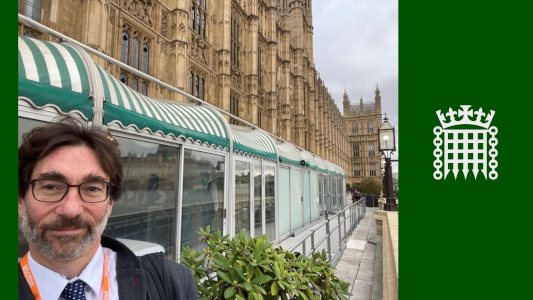
Milo at the Houses of Parliament
Composites UK hosted it’s third Parliamentary Reception at the House of Commons on 13th October 2025, Milo joined to hear about the UK Government’s Industrial Strategy White Paper and the implications for composite material manufacturing and investment. The event emphasized the importance of the composites industry to the UK economy (over 50,000 jobs, and >£13B revenue generated). Programmes like NextCOMP are part of this ecosystem, and developing new ideas that improve composites in compression are an important area of interest for next generation of composite materials.
-
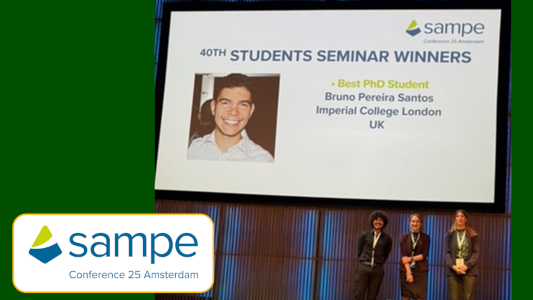
YES Bruno wins in Amsterdam!
After winning the Society for the Advancement of Material and Process Engineering (SAMPE) UK & Ireland YES (Young Engineers & Students) Seminar Competition earlier in the year Bruno joined as one of the 16 students to competed in the 40th SAMPE European heat of the Students’ Seminar as part of the SAMPE Europe Conference 25 held in Amsterdam, Netherlands on the 6th October.
Bruno presented his work on the "Arrest of Unstable Compressive Cracks in Carbon-Fibre Reinforced Polymers Using Local Ply-Discontinuity" and won! He became the 6th SAMPE UK & Ireland student to win in his class with his prize a trip to compete in the Global YES Seminar Competition in Seattle, USA representing SAMPE Europe.
Congratulations Bruno and best of luck for the next competition.
-
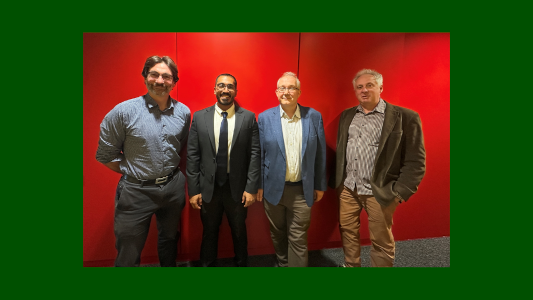
Congratulations Dr Hassan Almousa
We have the pleasure of announcing that on the 29th September 2025 Hassan Almousa defended his PhD thesis “Continuous Growth of Carbon Nanotubes on Carbon Fibres for Enhanced Composite Performance: From Black Box to Blueprint”. Photographed shortly after the viva (above) with his supervisor Prof Milo Shaffer (left, Imperial College London), and examiners Prof Ian A Kinloch (second from the left, The University of Manchester) and Prof Eduardo Saiz Gutierrez (right, Imperial College London).
- "My affiliation with NextComp during my PhD has been highly enriching, providing a direct bridge between academia and industry. It offered valuable insight into the latest developments in composites and helped connect my research to practical applications. The diverse expertise within the NextCOMP community consistently led to productive collaborations — spanning discussions from fundamental science to technology development — while building professional relationships that will last well beyond the PhD. As I embark on the next chapter of my career, I look forward to staying connected and continuing to contribute to this dynamic community."
- - Dr Hassan Almousa
Hassan will returned to Saudi Arabia working at Aramco, we wish him all the best in his new role and hope to collaborate in the future.
-
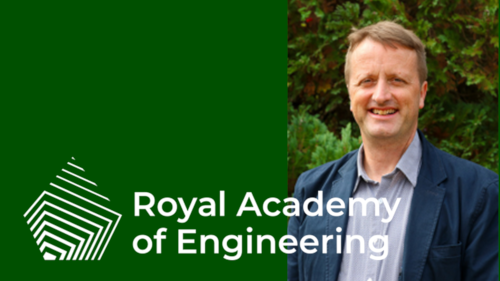
Stephen is elected as a Fellow of the Royal Academy of Engineering
We are delighted to announce that Professor Stephen Eichhorn (University of Bristol) has been elected as a Fellow of the Royal Academy of Engineering (FREng). Stephen commented via a LinkedIn post;
"I’m delighted to have been elected a Fellow of the Royal Academy of Engineering. I join 73 other leading figures in the fields of engineering and technology to be elected this year.
Obviously, it goes without saying that this is no singular achievement. I am so grateful to my many diverse and wonderful students, researchers and collaborators who have worked with me on the engineering and science that we do on #cellulose. EDI is in all of what we do, and is not separate. Thank you to you all, and I will be using this position to continue to advocate for change."
For a full article please see the news post by University of Bristol.
-
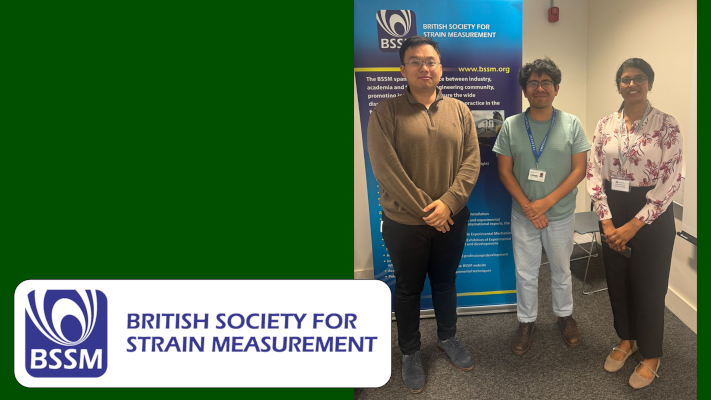
Gustavo, Bohao, and Mounika @ BSSM 19th AEM
The British Society for Strain Measurement (BSSM) hosted the 19th International Conference on Advances in Experimental Mechanics at Imperial, London over 2nd to 4th September 2025. The event was attended by Gustavo Quino (who also helped to organise the event), Bohao Zhang, and Mounika Karlapudi, they present their work; "Digital image correlation for composites under impact", "The experimental investigation of shear response of epoxy matrix under compression", and "Mechanical characterisation of bio-based epoxy resin using Shear Compression Specimen", repectively.
-
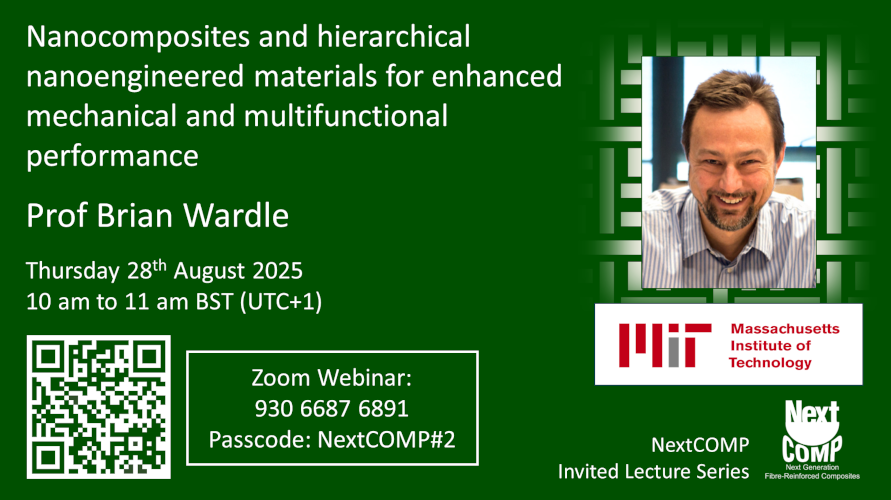
Prof Brian Wardle "Nanocomposites and hierarchical nanoengineered materials for enhanced mechanical and multifunctional performance"
= Video will be uploaded shortly =
Abstact: Bulk nanostructured materials offer tremendous opportunity for re-inventing materials, but also pose challenges both in terms of characterization, processing, design, scaling, and manufacturing. This talk will present recent work developing nanoengineered hierarchical advanced (aerospace-grade) composites with enhanced mechanical properties, with a focus recently on physics that allows imparting multifunctionality, and resulting technologies. Such hybrid nanoengineered advanced composites employ aligned nanofibers (in most of our work, aligned carbon nanotubes, A-CNTs) in several architectures to enhance bulk properties of existing aerospace-grade advanced composites. Building multifunctionality concurrent with these mechanical property improvements includes thermal and electrical conductivity tailoring for ice protection, damage sensing, and self-manufacturing, among others.
We would like to thank Brian once more for the lecture given on 28th August 2024 which was well attended in-person and virtually. For those unable to join on the day a video will be uploaded once it has been edited.
-
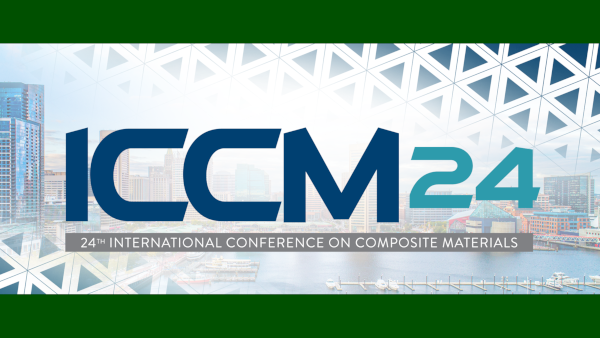
NextCOMP Special Session @ ICCM24
NextCOMP Team are delighted to have organised the special session "Compressive Failure" at ICCM24 (24th International Conference on Composite Materials) in Baltimore, Maryland, USA, organised by Silvestre Pinho, Richard Trask, Milo Shaffer, and David Anthony held at the Baltimore Convention Center in Room 317. Many thanks to all contributors, we had a total of 21 speakers over three days and seven sessions which is one of the largest special sessions at the conference!
The session's keynote given by Frédéric Laurin - ONERA Paris-Saclay University "Study of the Longitudinal Compressive Strength of Laminated Composites Using Various Classical and Innovative Tests at Different Temperatures" started the session off on the 6th August 2025.
There was a wide range of topics presented the sessions were well received! Thank you to all those who contributed to the enjoyable event; Michael Wisnom, Dimitrios Bikos, Vincent Keryvin, Hwei Linn Khoo, Tommaso Magrini, Charles Shaw, Lars Mikkelsen, Paul Davidson, Takayu Nishioka, Bruno Santos, Ertugrul Sari, Laura Pickard, Masahito Ueda, Cameron Woodgate, Guillaume A Seon, Mark Flores, Gustavo Quino, Pinelopi Mageira (who was nominated for the Tsai Award), Bohao Zhang, Joe Rifai, and Gursahib Bhatia.
NextCOMP also appreciates the chairs and co-chairs for hosting the sessions; Silvestre Pinho, Richard Trask, David Anthony, Paul Robinson, Joe Rifai, Gustavo Quino, Cameron Woodgate, Michael Wisnom, Gursahib Bhatia, Charles Shaw, Hassan Almousa, Dimitrios Bikos, Hwei Linn Khoo, Laura Pickard, and Bruno Santos.
-
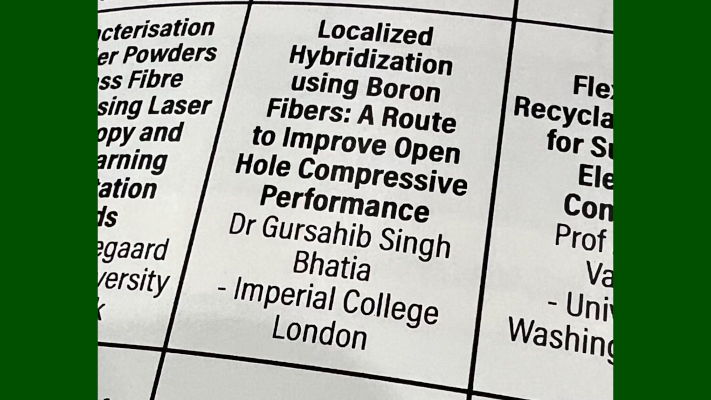
Specialty Materials+Imperial @ ICCM24
Specialty Materials recognizes the advanced research conducted on boron fiber and carbon fibre hybrid composites conducted by Imperial College London with a press release. Specialty Materials has been in collaboration by providing composite materials that include boron fibres within plys (Hy-Bor®) as well as individual boron fibres which has been investigated in localised regions in compression during the project. The research have already produced a publication in Composites Part B with more planned for the future. The work highlights sucessful application of high performance materials, and was summaried in a talk by Dr Gursahib Bhatia at ICCM24 "Localized Hybridization using Boron Fibers: A Route to Improve Open Hole Compressive Performance" which rounded off the Compressive Failure Special Session (LinkedIn post).
-
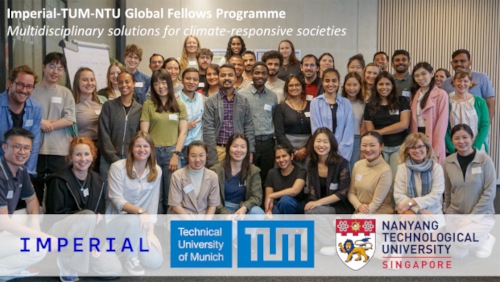
Hwei Linn @ International Global Fellows Programme
Hwei Linn Khoo joined the Global Fellows Programme a week long course focusing on "Multidisciplinary solutions for climate-responsive societies". The programme runs as partnership between Imperial, the Technical University of Munich (TUM), and Nanyang Technological University (NTU Singapore) this year held over 28th July to 1st August 2025 hosted by TUM in Munich, Germany and involves approximately 40 doctoral researchers from the three universities.
The course had a strong focus on interdisciplinary and collaborative research and intercultural awareness, the requireents to establish and continue successful collaborations.
-
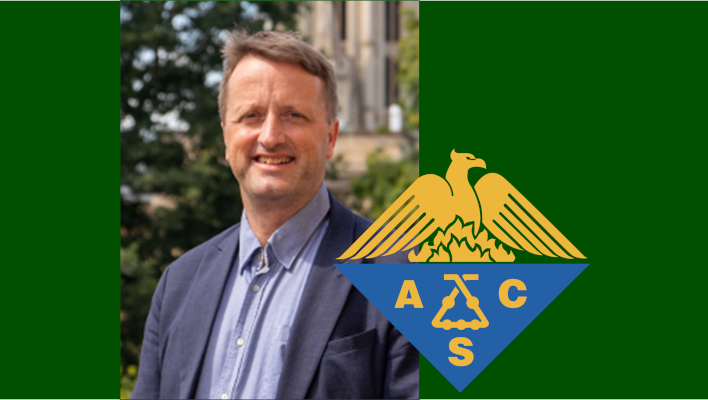
Steve Eichhorn is elected as 2025 ACS Fellow
Congratulations to Prof Stephen Eichhorn, who’s been elected as a Fellow of the American Chemical Society in the class of 2025. Steve is the first UK-based scientist to have been given this honour.
His award statement states that Professor Eichhorn is; “Recognized for extensive contributions to the physical science of cellulose through establishing key relationships between the mechanical and chemical functionality of fibres, composite interfaces, and functional materials” as well as “for service to the Cellulose and Renewable Materials Division”.
Further comments and details can be found in the University of Bristol's press release .
-
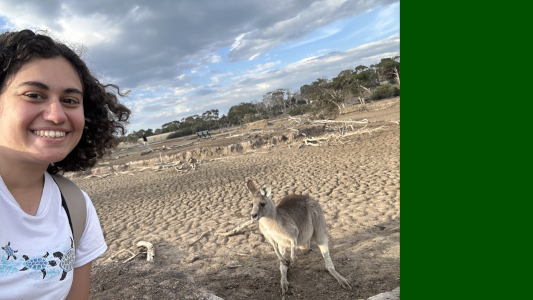
Eleni studying down under in Manesh
Eleni Georgiou has recently returned from a 14-week research placement at Monash University (Australia), under the supervision of Assoc. Prof Matthieu Gresil and Prof Neil Cameron and also hosted by Prof Luke Henderson at Deakin University (Australia). The research focused on the characterisation of the interphase between basalt fibres and epoxy pultrusion resin as was made possible during a Centre for Doctoral Training in Composites Science, Engineering and Manufacturing (CoSEM CDT) studentship at the University of Bristol.
Eleni said, “My placement was an invaluable experience from both a personal and professional perspective. It provided the opportunity for me to live abroad and travel alone for the first time and build connections both professionally and socially (especially when feeding the kangaroos and meeting Emily the koala). Whilst in Melbourne, I was able to collaborate with research groups at Monash and Deakin Universities. I also visited Carbon Nexus, a unique open-access carbon fibre composite research facility located at Deakin, and Australia's Defence Science and Technology Group, where I presented my project to researchers in the Materials Team. Overall, the work I conducted at Monash and Deakin was incredibly valuable to my PhD and I'm very grateful for the time, knowledge, and support from all the researchers I worked with during my time in Melbourne.”
-
Show & Tell: Materials & Manufacturing with Milo and Emile
NextCOMP members Prof Milo Shaffer and Prof Emile Greenhalgh presented at the Materials & Manufacturing Show and Tell Series - Innovate UK Business Connect on the 16th July 2025. Emile presented research related to the Advances in Structural Energy Storage and the Aspiration for Massless Energy, and Milo presented Fibre Composites Under Compression: Opportunities from the NextCOMP Project.
The ‘Show and Tell’ series is specifically for academics who have innovative technology, and who are looking to scale-up or commercialise this through collaboration and partnerships. This is part of the Innovate UK’s Materials and Manufacturing Vision 2050 and the opportunities that lie ahead for the UK Materials and Manufacturing sectors and net zero future.
If you missed these talks they were recorded and are available via the UKRI website, or directly on Vimeo (1106051395) 32:10 min.
-
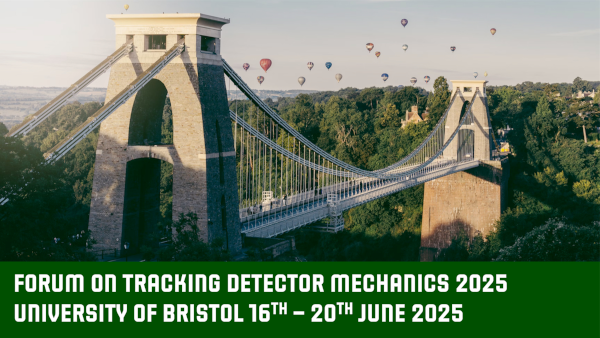
Forum on Tracking Detector Mechanics 2025 organised by Laura
Dr Laura Rhian Pickard (University of Bristol) helped organised the Forum on Tracking Detector Mechanics 2025 over 16th - 20th June 2025 which was held at the University of Bristol. The event brought together Physicists and Engineers from all over, and the DRD8 CERN Group who held a collaboration meeting over two of the days. Please visit the event website for more details and for future forums, or the Bristol Composites Institute Blog article.
-
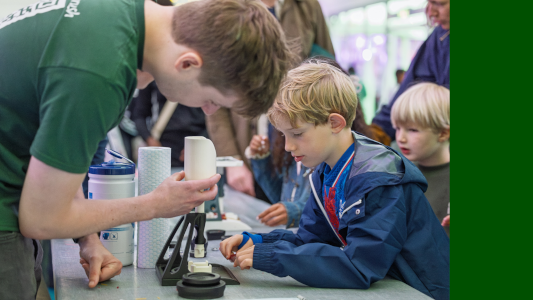
Photo Credit: © Brendan Foster Photography
NextCOMP at Great Exhibition Road Festival 2025
Over 55,000 visitors attended the Great Exhibition Road Festival 2025 over the weekend of 7-8 June 2025, sharing the joy and excitement of the annual event celebrating the arts and sciences. NextCOMP had a large stand in the Family Zone this year with even more jelly and spaghetti composites being tested by all of the festival researchers (over 700!). Amid quite a sprinkling of rain (and benefiting from the large tent) the stall was well attended with those from all ages. Many thanks to all those who helped out on the day including NextCOMP Team members Dr Dave Anthony, Prof Milo Shaffer, Dr Soraia Pimenta, Dr Dimitris Bikos, Kasper Hansen, Dr Gustavo Quino, Prof Silvestre Pinho, Dr Cameron Woodgate, Dr Charlie Shaw, Hassan Almousa, Yanhao Sun and from Chemistry, Materials, and Mech Eng Department Ploy Chomkhuntod, Monaly Depala, Yulun Zheng, and Sam Patel.
-
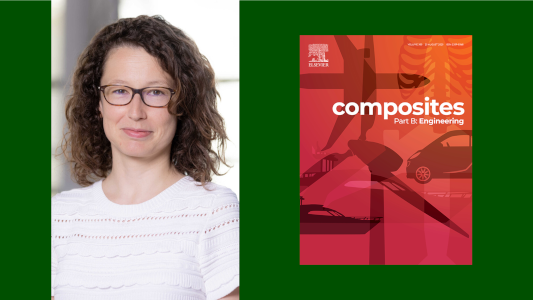
Soraia wins the Composites Part B: Engineering Mid-Career ‘Excellence in Composites Engineering’
Everyone at NextCOMP would like to celebrate Dr Soraia Pimenta being presented with the 2025 Composites Part B: Engineering Mid-Career ‘Excellence in Composites Engineering Award’! This prestigious accolade will be presented in-person at the up-coming International Conference on Composite Materials 2025 in Baltimore, USA.
-
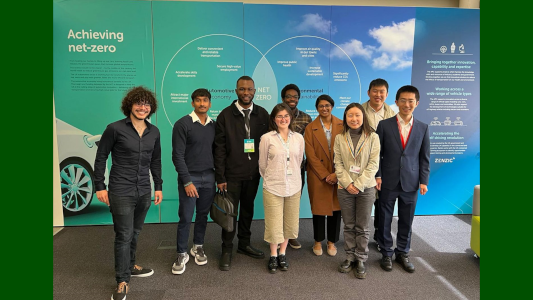
Bruno wins YES Seminar Competition 2025
Bruno Pereira Santos from Imperial College London wins the top prize for his presentation on innovative crack arrest in carbon-fibre composites at SAMPE UK & Ireland YES Seminar Competition 2025, earning him a place at the SAMPE Europe Conference in Amsterdam this October.
“The event itself was really interesting. It was nice to see what other universities are developing in the field of composites and how that communicates with our research. It was also great to get a grasp of how other students present their work and connect with the audience (there's a lot I should learn from them). There were quite a few really compelling seminars, Mounika's included, and people were keen on learning more about each other's projects even after the even after the event was finished. Overall, a great atmosphere.”
- Congratulations Bruno!
-
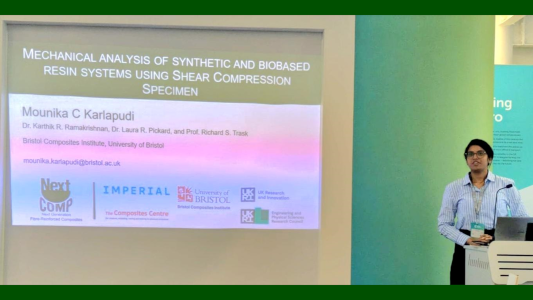
NextCOMP PhDs enter the SAMPE UK & Ireland YES Seminar Competition 2025
SAMPE UK & Ireland Young Engineers and Students Seminar Competition 2025 was held on the 22nd May and showcased NextCOMP PhD students Bruno Santos (Imperial) and Mounika Chowdary Karlapudi (University of Bristol) work for the first time at the Advanced Propulsion Centre UK, held at University of Warwick. Mounika and Bruno delivered well received research presentations, and both were short listed for the final round, while fellow NextCOMP student Nic Darras contributed as a valued judge on the evaluation panel fresh from his previous year’s success in the competition. Their combined participation highlights the talent and leadership emerging from the NextCOMP programme.
-

Congratulations Dr Cameron Woodgate
We are pleased to announce that on the 14th May 2025 NextCOMP funded PhD student Cameron Woodgate defended his thesis “Raman Spectroscopic Stress Analysis of Carbon Fibre Composites in Compression”. Photographed shortly after the viva (above) with his supervisor Prof Stephen Eichhorn (left, University of Bristol), and examiners Dr Dimitrios Papageorgiou (second from the left, Queen Mary University of London) and Prof Annela Seddon (right, University of Bristol). Cameron is staying with NextCOMP and continuing his academic journey but moving to Imperial College London as a Postodctrial Research Associate with the Shaffer Group.
-
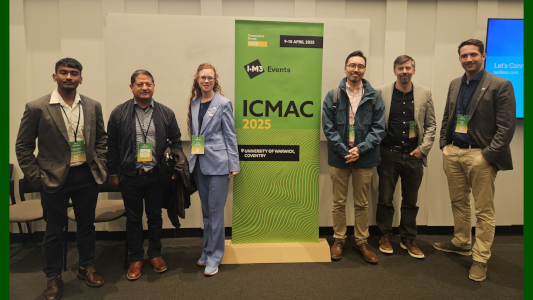
NextCOMP @ ICMAC 2025
International Conference on Manufacturing of Advanced Composites 2025 also known as ICMAC which is organised by the Institute of Materials, Minerals & Mining (IM3) was held in Covery at the University of Warwick over the 9th and 10 th April. Our External Advisory Board member for NextCOMP, Prof Veronique Michaud presented the keynote before Nic Darras and Laura Pickard presented their research in the Textiles & Preforms session. Laura's presentation gave an overview on different composite structures made from fuzzy carbon-overbraids, while Nic presented how the manufacturing parameters of these overbraided rods will impact the design and the performances of the larger structures. Laura commented, “It was really enjoyable to discuss our research with an audience full of engaged people with innovative ideas. Thank you to the ICMAC team for all your hard work in organising such a fun and fascinating conference”.
-
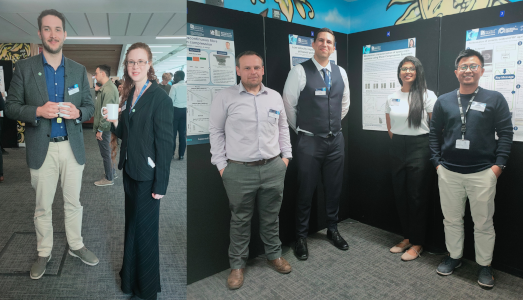
Bristol Composites Institute PGR Symposium 2025
The Annual Bristol Composites Institute Postgraduate Research Symposium 2025 held on the 8th April in Bristol was a vibrant gathering of over 200 researchers, industry partners, and students. The day featured 19 technical talks, seven quickfire sessions, and two keynotes, concluding with a dynamic panel discussion led by industry experts.
Among the highlights, members of the NextCOMP Bristol Team Nicolas Darras, Joe Rifai, and Ian Lee, presented their PhD work, while Mounika Chowdary Karlapudi and Sudirja Sudirja showcased their research with posters. NextCOMP Postdocoral Researchers Dr Laura Rhian Pickard and Dr Kyungil Kong, along with supervisors Prof Richard Trask, Prof Giuliano Allegri, Prof Ian Hamerton, and Prof Michael Wisnom, were there to support and engage with the team.
-
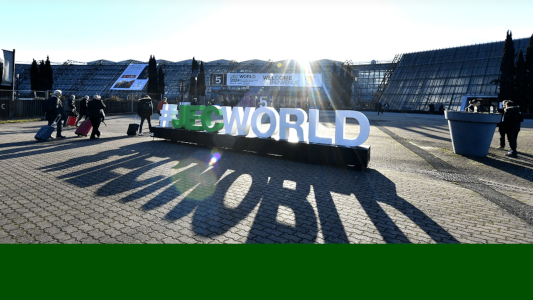
NextCOMP at JEC World 2025
A large cohort from NextCOMP visited this year’s JEC World in Paris at the over the three days, 4th-6th April 2025. The event is huge, a scale hard to describe without sounding as if you are exaggerating - over 1350 exhibitors in over 78 000 square meters of show floor with over 45 thousand visitors! It easily took two whole days just to walk by every stand and there was everything you could want (composite related) from fibre manufacturers, to resin suppliers, to key turn solutions for all your composite needs! NextCOMP members, Prof Milo Shaffer, Dr Dave Anthony, Dr Gursahib Singh Bhatia, Dr Laura Pickard, Hassan Almousa, and Yanhao Sun took in as much as possible engaging with suppliers and finding out the latest trends and what’s hot in the composite field. There was even an opportunity to meet up with some old colleagues as well bumping into old friends you didn’t know were there! The Team hope to engage with industry to advance the technologies developed in NextCOMP to the next stages, what this space!
-
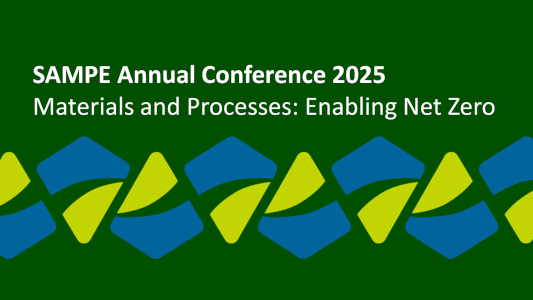
Nic at the SAMPE UK & Ireland Annual Conference 2025
Nic Darras was invited to the SAMPE UK & Ireland Annual Conference - Materials and Processes: Enabling Net Zero on the 27th March 2025 which was held at the University of the West of England, Bristol, as the UK winner of last year’s (y2024) Young Engineer Student (YES) competition. He presented his research on the manufacture of overbraided rigid core, “It’s a fantastic opportunity to share the progress of my project and engage with industry and academic leaders in advanced materials.”
-
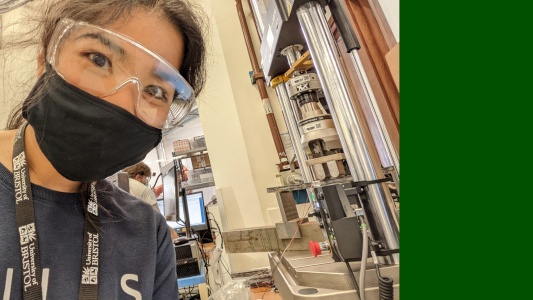
Congratulations Dr Aree Tongloet
We are proud to announce that Aree Tongloet has successfully defended her PhD Thesis “Compressive Behaviour of Longitudinal Hybrid Composites” in March 2025. The photo (above) shows Aree mid-experiment on a four-point bend test at the University of Bristol. Aree has returned to Thailand taking up a post at the Rajamangala University of Technology Krungthep, we wish her all the best in her new role and hope to collaborate in the future.
-
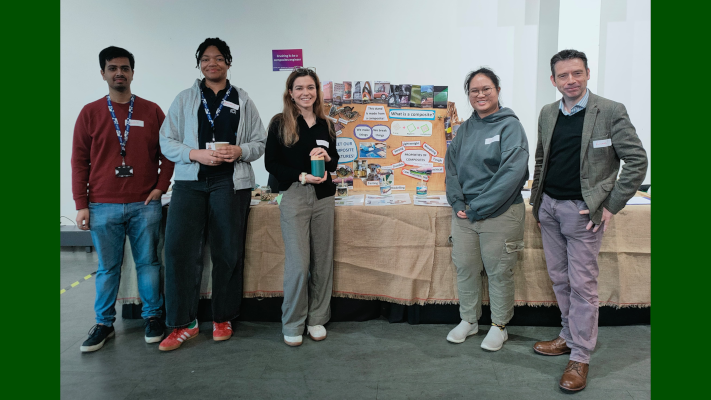
The future... the FUTURES Schools Research Fair 2025
NextCOMP Team members Richard Trask, Laura Pickard, and Bohao Zhang, and students from the University of Bristol CoSEM CDT programme Boss Budninpech and Jula Schroeder, were joined by Ayanna Davis and Tanveer Talokder from the National Composites Centre at the FUTURES Schools Research Fair to engage with pupils aged 9–11 with hands-on activities designed to demystify composite materials with local primary school students. The event on 14th March 2025 on the S.S. Great Britain, was part of the FUTURES Festival events, aimed to inspire curiosity and interest in science and engineering among young learners.
The activities for children included information about natural composites, where to find them, their current uses, and our famous "NextCOMP Crusher", an activity with jelly and spaghetti that teaches the testers how material combinations and fibre orientation enhance structural integrity. For more details about the event please visit the University of Bristol, Bristol Composites Institute Blog post.
-
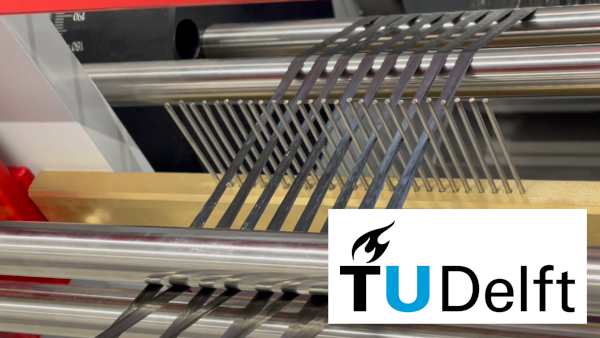
TU Delft NXTGEN Innovation Days 2025
Prof Michael Wisnom and Dr Soraia Pimenta were invited the TU Delft NXTGEN Innovation Days and to talk at the Delft TapeLab Symposium on the 7th February 2025, the day after the official opening of the facility. Their talks were well attended and in a session mainly featuring approaches for novel composites as a route to sustainable aviation. The visit highlighted equipment available for collaboration at the cutting edge facilities at TU Delft with a focus on processing fibre (TU Delft TapeLab) and textiles for making and testing high performance composites.
-
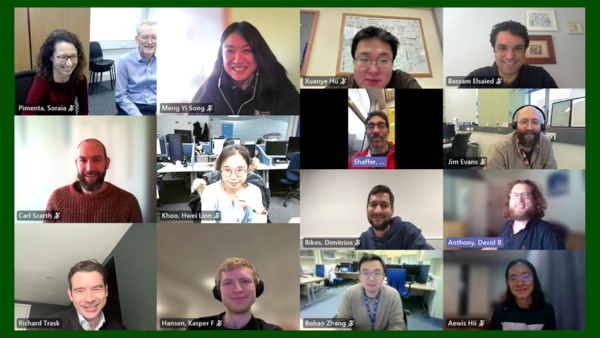
NextCOMP + CerTest Workshop Mini-Conference
NextCOMP Team members and CerTest (Certification for Design - Reshaping the Testing Pyramid, EP/S017038/1) Team members joined in an online workshop on the 22nd January 2025 to present on-going work, and discuss how each programme might benefit from sharing methodologies and approaches. Positive discussions were made with literature and protocols shared between programmes. The event brought together two large groups working in composites with a shared goal of improving testing, and hopefully more to come in the future.
-
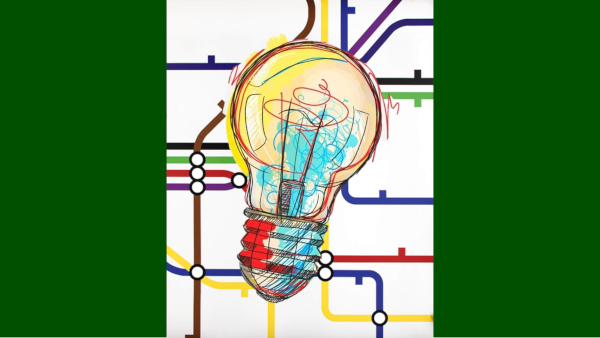
NextCOMP 7th Workshop on mind map
As the NextCOMP programme heads into the later stages it seems appropriate to take a moment to take stock and think about all the approaches we have identified towards improving fibre reinforced composites and produce a mind map. This was a different way to approach the programmes goals and gave the Team a chance to consider the overall interconnections. It was a thoughtful exercise and Team benefited from the workshop and a chance to think about the reach and progress that programme has achieved so far.
-
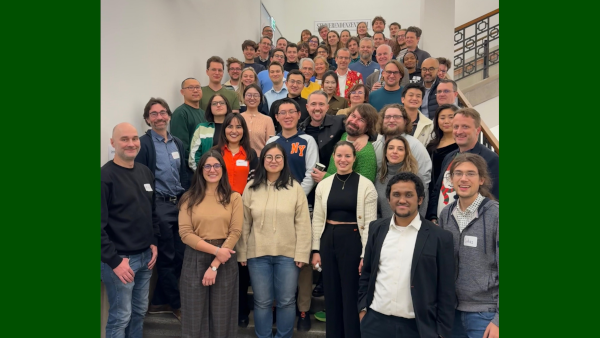
NextCOMP at 9th International PaCE X-mas Symposium
NextCOMP returned for the 9th International PaCE X-mas Symposium hosted this year by Professor Alexander Bismarck (University of Vienna, Austria),and Koon-Yang Lee (Imperial College London, UK). The event has grown to a day and a half of talks over the 18th and 19th December 2024 at the University of Vienna. “Pints of Science” opened the proceedings and Dave Anthony (Imperial College London, UK) gave a talk on “♫♫ Scale up... is not a repeat ♫♫” as part in an extended session featuring Stefan Spirk (TU Graz, Austria) and Duncan Leeson (Holcim GmbH, Austria). It was the first year that Professor Steve Eichhorn (University of Bristol, UK) was invited and he gave a talk on “Converting and storing energy: Keeping active for Christmas using nanocellulose”, and NextCOMP’s Principle Investigator Professor Milo Shaffer (Imperial College London, UK) presented “Continuous wet-spinning of lignin using a low-cost ionic liquid for cost-effective, sustainable carbon fibers”. Mr Yanhao Sun (Imperial College London, UK) also joined in with a poster titled “Continuous grafting carbon nanotubes on carbon fibres using a CVD system” as did Ms Diana Bratilescu (University of Vienna, Austria) presenting "High-performance polyetherimide composites". A surprising famous painting, and replicas and even reproductions captured the speakers and crowds attention throughout the event, but you might have to have been there to appreciate all the versions.
-
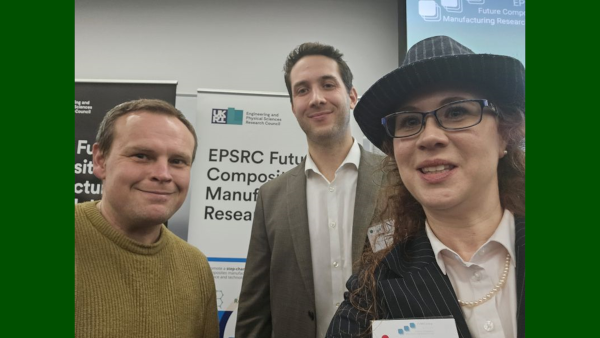
Future Hub Open Day 2024
The EPSRC Future Composites Manufacturing Research Hub's Open Day 2024 hosted at the University of Nottingham on the 17th December 2024 was a great opportunity for NextCOMP Members Laura Pickard, Ian Lee, and Nicolas Darras to catch up with the very latest news from academia and industry, as well as tour the labs of the Additive and Composites Laboratories within the Advanced Manufacturing Building at the University of Nottingham. Laura had the opportunity to speak at the Career Journeys and Researchers Network presentation session and even surprised a few attendees with the fact that she had started her journey in astrophysics!
-
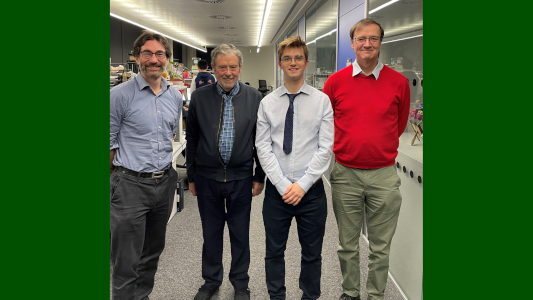
Congratulations Dr Charlie Shaw
We are happy to announce that on the 5th December 2024 our first fully NextCOMP funded PhD student Charlie Shaw defended his thesis “Bicontinuous silica-epoxy matrices for fibre-reinforced composites”, photographed (above) with his supervisor Prof Milo Shaffer (left, Imperial College London), and examiners Prof Terry McGrail (second from the left, The University of Edinburgh) and Prof Paul Lickiss (right, Imperial College London) shortly after the viva. Charlie is continuing his academic journey joining as a Postodctrial Research Associate with NextCOMP and the Shaffer Group at Imperial College London.
-
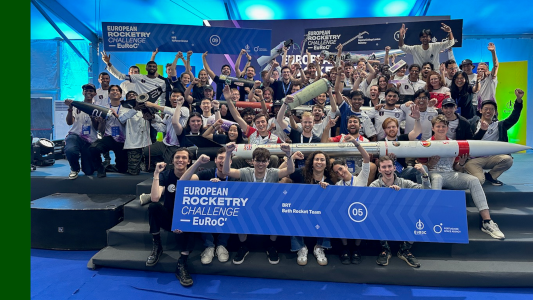
EuRoC’24: High Winds and High Drama
At the European Rocketry Competition in Ponte de Sor, Portugal held in November 2024, composites were crucial for most of the teams, with some lovely rocket components on display. None could match the novelty of the ‘space sponge’ taking inspiration from the natural world. Developed by the Bristol’s HyPower Team from Bristol Composites Institute’s CoSEM CDT students and linked to the NextCOMP programme, the students created a novel lattice structure coupling based on the skeleton of a sea sponge. Supported by staff such as Dr Laura Rhian Pickard, Dr Steve Bullock, and Natalie Wiggins, the team took full advantage of EuRoC’s technical evaluations, earning praise for their rapid progress and creativity
Read more about the EuRoC’24 event in the University of Bristol Blog and all the details about the rocket presented for launch in this Blog post. A video highlight of the Design, build, Test Project can be found on YouTube (YNhVaHDRZOM, 9 min 37 s) and Bristol Composite Institute’s LinkedIn post for the 2024 project. For further information please visit the HyPower Team’s LinkedIn or the Bristol SEDS homepage. Additional YouTube videos of the HyPower EuRoC24 Team are included below;
- 🚀 EuRoC24 Dr. Laura Pickard & Steve Bullock How HyPower Bristol built an epic Rocket in just 1 Year! (YouTube qMLJ-2DCGIs, 13 min 32 s)
- 🚀 EuRoC24 HyPower Bristol Bio-Inspired Thrust Structure in person Testing! (YouTube qMLJ-2DCGIs, 14 s)
- 🚀 HyPower Bristol Team's Rocket at the Paddock 🚀 | EuRoC 2024 (YouTube hlCasDtt7Uc, 25 s)
-
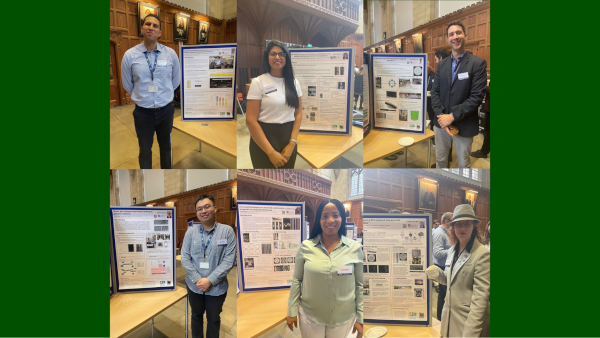
BCI & NCC Annual Conference 2024
The Bristol Composites Institute and National Composites Centre (NCC) Annual Conference 2024 was held at the Great Hall of the Wills Memorial Building in Bristol on the 24th October welcoming over 150 guests for talks covering the topic "Driving innovation in composites". NextCOMP was well represented at the event with Laura Pickard presenting "Industry linked teaching" as well as Bohao Zhang, Iheoma Nwuzor, Joe Rifai, Mounika Karlapudi, Nicolas Darras, and Laura Pickard presenting their latest work though posters.
-
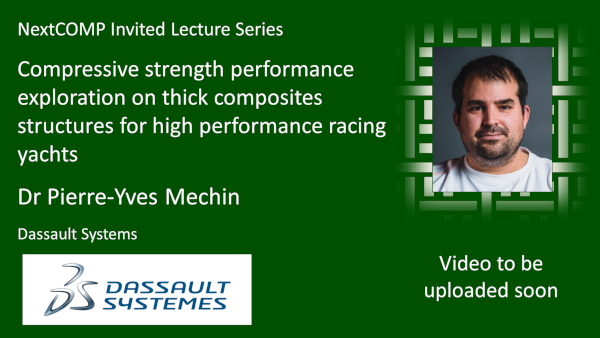
Dr Pierre-Yves Mechin "Compressive strength performance exploration on thick composites structures for high performance racing yachts"
= Video will be uploaded shortly =
Abstract: A long-term collaboration between University of South Brittany (IRDL), Dassault Systémes & marine engineering eco-system in Lorient has been established for the past 12 years with positive collaboration and results. Racing yachts are designed with dominant use of composites materials with significant anisotropy in layups and large thicknesses and high stiffness (HM400 or higher). For foils, mast & hulls, composites are often in compression (static & fatigue). The compressive strength is therefore a major topic to explore and a key parameter for performance (weight vs. stiffness). The purpose of the talk is to give an overview of the compressive strength studies & results performed with multiscale analysis considering constituents, process. This was done with a double work of experiments & numerical analysis to understand the mechanism and validate observed trends. Experiments were conducted with different resins, fibres, stackings, manufacturing process to understand the mechanism, compare materials to propose new epoxy resins and fibres combinations to increase the compressive strength. The fact that racing boats are not much defined with standard materials offer a large range of configurations to explore. Numerical studies were done to qualify an analytical model which qualify the compressive strength as a structural property, not a material value. The model was first used to get explanation on trends and more recently proposed for a general validation. The combination of CATIA & Abaqus technologies as part of the 3DEXPERIENCE Platform allow to explore the effect of the manufacturing through generation of RVE models with random fibres arrangement and waviness.
We would like to thank Pierre once more for the lecture given on 26th September 2024 which was well attended in-person and virtually as part of our Next Generation Fibre-Reinforced Composites (NextCOMP) Invited Lecture Seminar Series. For those unable to join on the day a video will be uploaded once it has been edited.
-
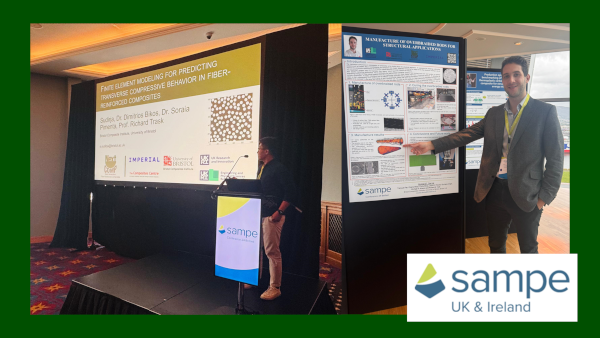
Nic and Sudirja at SAMPE Europe 2024 Conference: Advancing Composite Materials and fostering collaboration in Belfast
The SAMPE Europe 2024 Conference was held from 24th to 26th September 2024 at the iconic Titanic Museum in Belfast, Northern Ireland. This prestigious event was organised through a collaboration between SAMPE UK & Ireland and SAMPE Europe, bringing together professionals, researchers, and industry experts in the field of advanced composites.
Over 100 authors took the stage across the three day event to present high-quality technical papers, focusing on cutting-edge applications in advanced composite materials and their processes, while more than 30 sponsoring companies displayed their latest innovations in the accompanying exhibition. The event drew a diverse group of delegates from over 25 countries, making it a truly international platform for knowledge exchange.
Participation from two NextCOMP team members added further value to the event. Nicolas Darras, who had previously won the SAMPE UK Student Seminar competition, had the opportunity to present in the SAMPE Europe Student seminar competition, showcasing his ongoing research. Meanwhile, Sudirja contributed as a technical paper presenter on 25th September 2024, sharing insights into his work on advanced composites. These contributions not only highlighted the importance of emerging research in the field but also demonstrated the active role of NextCOMP members in advancing composite technologies.
In addition to the technical sessions, participants were treated to a tour of the Titanic Museum, offering a chance to explore the history and stories surrounding the Titanic tragedy of 1912. The conference concluded with a gala dinner, providing an excellent opportunity for attendees to network, discuss their work, and establish potential collaborations. The SAMPE Europe 2024 Conference proved to be a successful and dynamic platform for sharing the latest advancements in composite materials, fostering valuable connections, and exploring future research opportunities in this rapidly evolving field.
-
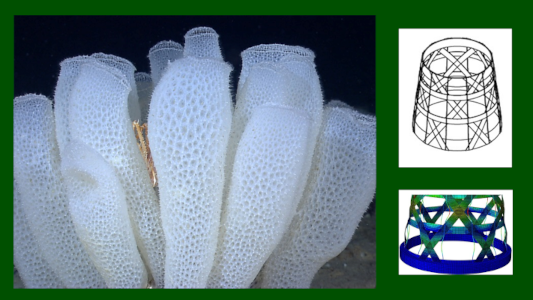
From the Seafloor to Space! Ian Lee's high-flying presentation at BSSM
NextCOMP Team Member Ian Lee recently presented at the 18th International Conference on Advances in Experimental Mechanics (BSSM-18), held at the University of Liverpool from the 3th-5th September 2024. Organised by the British Society for Strain Measurement, this conference series has a history dating to the society’s foundation in the 1960’s. Ian Lee attended as a representative of the Bristol Composites Institute (BCI) - Centre for Doctoral Training, and presented work undertaken by the 2023-2024 cohort - Design, Build and Test group project. The title of the presentation was "From Sea Sponge to Space". It outlined the methods and results generated by the group as they developed and tested novel composite structures for an aerospace application, taking inspiration from a biological composite structure featuring a lightweight, efficient, hierarchical geometry. Given the conference’s focus on experimental mechanics the presentation sought to highlight the detailed work the students had undertaken to capture, analyse and interpret the mechanical response the novel structures exhibited during testing.
The conference bought together researchers, academics, and industrial representatives from around the world to showcase and discuss innovations in the field of experimental mechanics. It was a welcoming, well organised, and focused event featuring lively discussions of the work presented, both in the lecture halls during the day and in the city during the evening’s social events. Ian was part of a large contingent from the Bristol Composites Institute who attended the conference, representing the wide array of work being undertaken which is of interest to the broader experimental mechanics community.
A number of NextCOMP members have cut their teeth in the world of composites in the Design, Build, and Test programme as part of their studies.
- Bristol Composites Institute 2023-2024 Cohort DBT project YouTube video featuring Dr Laura Pickard, Prof Richard Trask, Ian Lee, Prof Ian Hamerton, Prof Stephen Eichhorn, and Lucas Lu (YNhVaHDRZOM, 9 min 37 s)
- Bristol Composites Institute 2022-2023 Cohort DBT project YouTube video featuring Joe Rifai (Y4g9-aToKLQ, 7 min 7 s)
- Bristol Composites Institute 2021-2022 Cohort DBT project YouTube video featuring Ian Lee and Eleni Georgiou (dwhUXa9YBt0, 12 min 3 s)
-
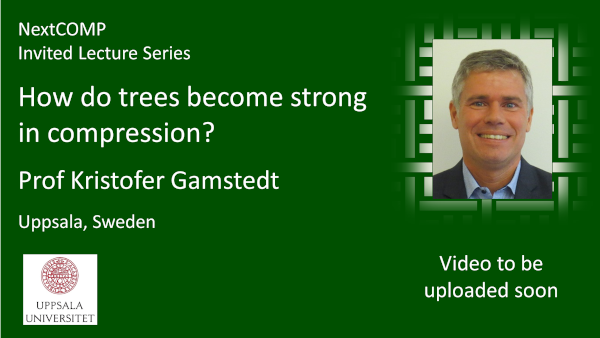
Prof Kristofer Gamstedt "How do trees become strong in compression?"
= Video will be uploaded shortly =
Abstract: Fibre composites have seen an outstanding development during the last 50 years. These materials bear many resemblances with wood; being fibrous, composed of complementary constituents, anisotropic and light-weight. Clearly wood materials, just like unidirectional composites, are very strong in tension in the fibre direction, but significantly weaker in compression. In this presentation, we illustrate some of the approaches utilised by trees to compensate for the relatively weak compressive properties. These include beneficial residual stresses, a hierarchical structure for crack arrest, formation of reaction wood tissues in compression, and counteracting the weaker compressive strength with high tensile strength material in other parts of the tree. Some of these mechanisms could perhaps be exploited to a larger extend in the design of composite materials and components.
We would like to thank Kristofer once more for the lecture given on 14th August 2024 which was well attended in-person and virtually. For those unable to join on the day a video will be uploaded once it has been edited.
-
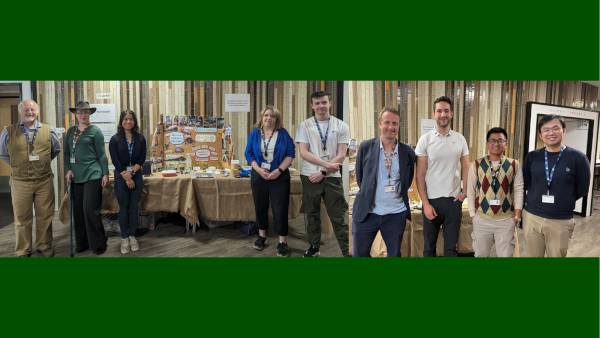
NextCOMP Inspiring Innovation in STEM
NextCOMP were delighted to engage with around 180 young people aged 14/15 from local Bristol schools at the Inspiring Innovation in STEM fair as part of the Bristol Teacherfest 2024 - Focus on Innovation in STEM, an event organised by the Bristol Education Partnership and the Widening Participation team at University of Bristol which took place on the University of Bristol School of Chemistry on 12th June 2024. Across the full day session the enthusiastic students accompanied by their teachers learned how nature's innovations inspire new composite materials, discovered more about what composite materials are and why they are so useful, and crucially, had the chance to design, manufacture and test their own composite using jelly and spaghetti with our signature NextCOMP Crusher activity.
NextCOMP academics Ian Hamerton and Steve Eichhorn gave excellent thought provoking and energetic introductions to spark the students "composites curiosity" and our fantastic NextCOMP researchers and students including Laura pickard, Bohao Zhang, Cameron Woodgate, Aree Tongloet, Sudirja, and Nic Darras were on hand to support students with the interactive Crusher activity and answer all manner of questions ranging from technical aspects of composites to what its like to be a researcher!
We had some brilliant feedback on the day, and afterwards. Comments on the event have included;
"The topics of the activities were all interesting - some of it was very relevant to ideas they learn about in class e.g. composites"
"The event was very engaging, I got to take part along with the students and everyone in the group was engaged".
-
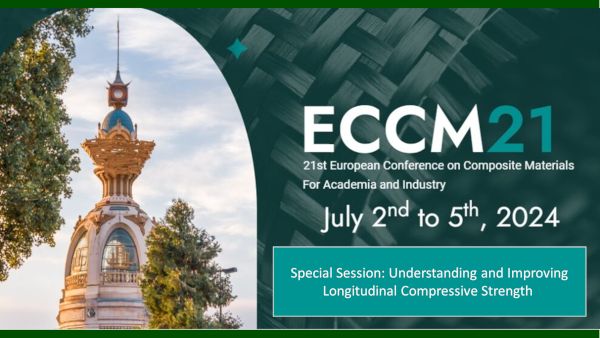
NextCOMP @ ECCM21
The NextCOMP Team are very pleased to have organised a large special session at the 21st European Conference on Composite Materials, Nantes, France featuring 29 presentations across five sessions over just two days (3rd and 4th July 2024). Understanding and Improving Longitudinal Compressive Strength session was organised by Silvestre Pinho, Richard Trask, Milo Shaffer, and Jo Gildersleve held at the La Cité Nantes Events Center in Auditorium 450.
It was great to see Michael Wisnom give a very closely related Keynote Lecture on the "Compressive Failure of Carbon Fibre Composites due to Instability at Structural, Material and Constituent Level" in the Auditorium 450 on the 4th July 2024.
There was a broad range of topics presented with a mix of industrial and academic presentations and the sessions were well received and on occasion the room was getting pretty full! Thank you to all those who contributed to the enjoyable event; Iheoma Nwuzor, Takayu Nishioka, Pierre-Yves Mechin and Vincent Keryvin, Pinelopi Mageira, Ian Lee, Minori Isozaki, Hwei Linn Khoo, Jon Meegan, Joe Rifai, Christian Hochard, Rupam Gogoi, Eleni Georgiou, Nicolas Darras, Claudia Creighton, Dave Anthony, Hassan Almousa, Luke Henderson, Bohao Zhang, Cameron Woodgate, Ole Villam Ferguson, Masahito Ueda, Aree Tongloet, Soraia Pimenta, Silvestre Pinho, Charlie Shaw, Gustavo Quino, Lars Mikkelsen, Laura Pickard.
NextCOMP also appreciates the chairs and co-chair for hosting the sessions; Milo Shaffer, Bohao Zhang, Dave Anthony, Michael Wisnom, Gustavo Quino, Laura Pickard, Silvestre Pinho, Iheoma Nwuzor, Richard Trask, and Rupam Gogoi.
-
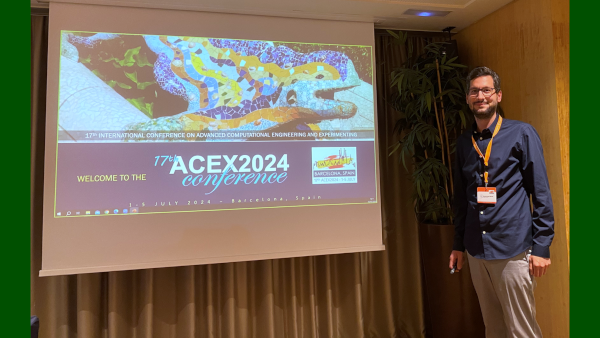
Dimitris Bikos Invited to ACEX 2024
Dr Dimitris Bikos was invited to give a talk on his work entitled “An Efficient Micromechanical FE Method to Simulate Real UD Composite Microstructures under Longitudinal Compression” in the special session on Composites, Metamaterials and Cellular Materials at the International Conference on Advanced Computational Engineering and Experimenting (ACEX2024), held in Barcelona from July 1st to 5th 2024. The conference showcased talks focusing on state-of-the-art and novel technologies in polymer science, additive manufacturing, metamaterials, and composites. Of particular interest were the opening plenary lecture by Prof JN Reddy, University of Texas A&M, who presented the coupling of Finite Element and Finite Volume Methods, and the opening talk by Dr Alberto Jimenez Suarez, University of Rey Juan Carlos, who presented on the development of foam fully based on recycled short carbon fibre composites. Dimitris said “It was a wonderful opportunity to advertise NextCOMP work to a wider engineering community, engage people from an array of countries and engineering fields, and see the material design for different engineering applications”. Dimitris’ talk was well received and stimulated productive discussion afterwards.
-
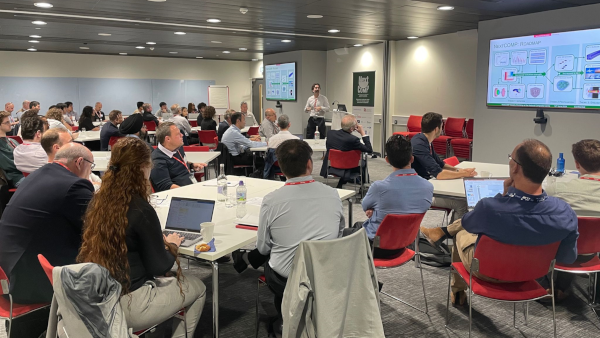
Industry Workshop 2024
It was great to have our NextCOMP Industry Workshop on the 19th June 2024 hosted at the National Composite Centre and would like to extend our thanks to thanks to Nicci M. and the Team. There was fantastic engagement from our many industry partners, great presentations from NextCOMP Team members Dimitrios Bikos, Hassan Almousa, Aree Tongloet, Laura Pickard, Emile Greenhalgh, and Bruno Santos, as well as from National Composites Centre colleagues Enrique Garcia and Roger Walker. Our World Café style Research Roadmap discussions were very productive and the whole day generated lots of potential ideas, future actions, and potential funding mechanisms to explore!
-
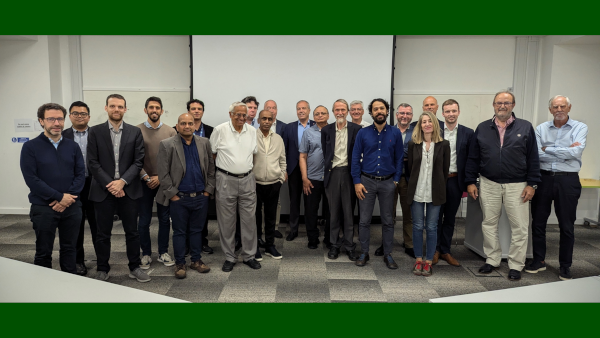
Bristol Composites Institute hosts 2024 Damage Workshop
Recently several of our NextCOMP researchers were invited to present posters at an invitation only two day Composite Damage Workshop which included many internationally renowned academics. Organised by Michael Wisnom and hosted by Bristol Composites Institute at University of Bristol, sessions included Longitudinal Tension Failure led by Yentl Swolfs, Micro Mechanisms of Transverse Cracking led by Elena Correa and Mahoor Mehdikhani, Fatigue led by Marino Quaresimin as well as a session on Compression led by Lars Mikkelsen.
Sessions on day two included presentations and discussions focused on different modelling methods to simulate the damage of composites at different scales (e.g., bottom-up multiscale method and high-fidelity modelling), addressing the limitations and benefits of these methods. The session featured talks from Stephen Hallett, Bassam El Said, and Federico Paris, followed by concluding remarks from Michael Wisnom.
Dimitrios Bikos, Cameron Woodgate, Aree Tongloet, Bruno Santos, and Joe Rifai all contributed posters at the event which were very well received.
Dimitrios said, "It was a great opportunity to discuss our NextCOMP research, meet with the world's leading scientists in the field of damage mechanics of composites, and learn from their insights regarding the current state-of-the-art modelling techniques to tackle recent challenges around damage of composites".
-
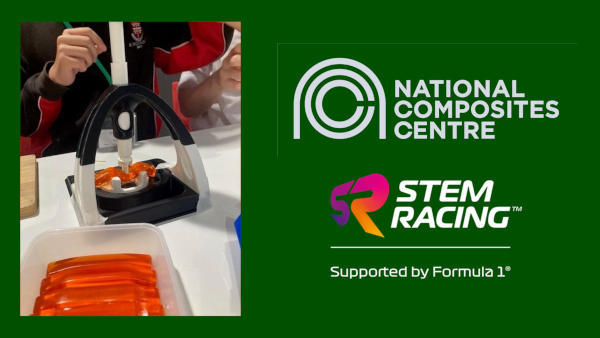
NCC and F1 in Schools + NextCOMP Crusher
The National Composite Centre in conjunction with F1 in Schools (now rebranded STEM Racing) hosted students and teachers from Kingswood School providing a tour of their facilities, and then an opportunity to make their own composites out of jelly and spaghetti and test them in the NextCOMP Crusher activity, devised and developed by the NextCOMP programme. The 22 students and the NCC enjoyed the event and plans are already afoot to using the kit again in their outreach.
-
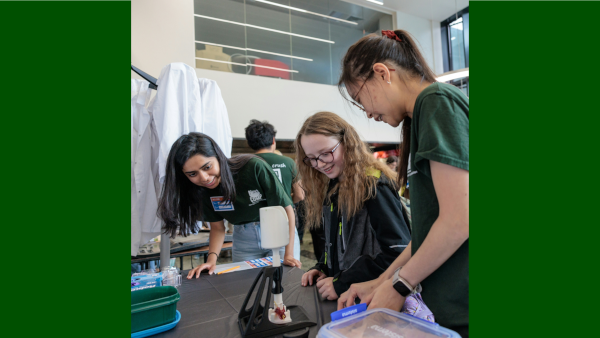
Photo Credits: © Brendan Foster Photography
NextCOMP + GERF2024
The NextCOMP Team had a great time at The Great Exhibition Road Festival 2024 at Imperial College London over the weekend of 15th and 16th June 2024. The festival brings together the local museums (V&A, Science Museum, Natural History Museum), Imperial, The Goethe-Institut, The Royal College of Music, and The Royal Albert Hall in a celebration of science, arts, and fun! The festival's theme 'Flourishing Futures' brought along budding scientists and engineers who were set the challenge to beat the NextCOMP crusher. Action filled for two full days over the weekend with over 300 jelly-spaghetti composites made and tested, which made an impact by being highlighted by organisers!
A big thanks to all the support from the GERF Team, and the effort from the EPSRC-funded NextCOMP crew including Hwei Lin Khoo, Charlie Shaw, Hassan Almousa, Rupam Gogoi, Bruno Santos, Gustavo Quino, Gursahib Bhatia, Dave Anthony, and Milo Shaffer as well as other members from the Shaffer Group, Enny Tran, Monaly Deala, and Yunze Jiang.
-
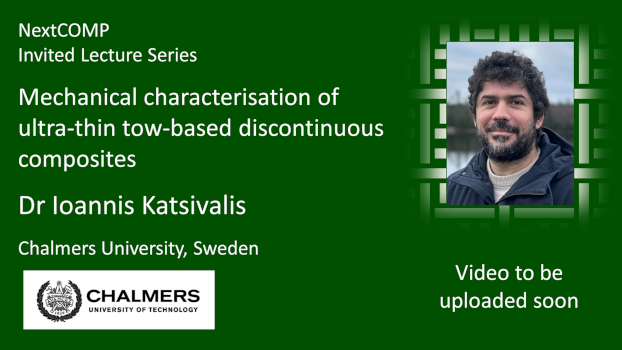
Dr Ioannis Katsivalis "Mechanical characterisation of ultra-thin tow-based discontinuous composites"
= Video will be uploaded shortly =
Abstract: A new class of composite materials which have gained significant popularity and represent an attractive alternative to Quasi-Isotropic (QI) laminates are the so-called Tow-Based Discontinuous Composites (TBDCs). These bio-inspired composite materials are manufactured by chopping continuous prepreg tapes and randomly distributing them, effectively creating a high-performance Sheet Moulding Compound (SMC) material. The random tape distribution generates in-plane isotropy, while the use of very low tape thicknesses (below 50 µm) reduces resin pockets and increases the attainable fibre volume fractions. Using thin tapes also shifts the dominant damage mechanisms, effectively eliminating transverse tape fracture and promoting tape pull-out instead. In addition, TBDCs display increased manufacturability and reduced costs and therefore expand the design space significantly. This presentation aims to provide an overview of the experimental work conducted on the TBDC material including tensile testing, fatigue characterisation, notch sensitivity analysis, bond evaluation, and compressive testing.
We would like to thank Ioannis once more for the lecture given on 7th June 2024 which was well atteneded as part of our Next Generation Fibre-Reinforced Composites (NextCOMP) Invited Lecture Seminar Series. For those unable to join on the day a video will be uploaded once it has been edited.
-
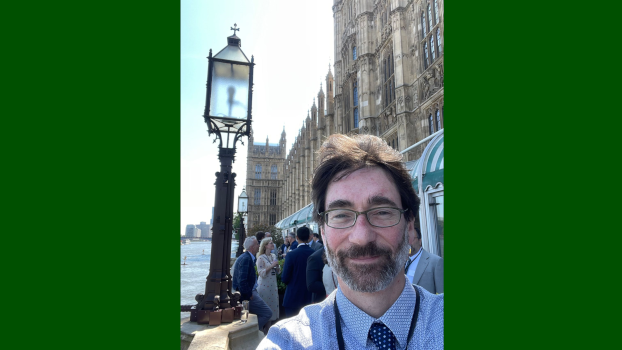
Advocacy in action at the Composite UK Parliamentary Reception
Prof Milo Shaffer popped along to Westminster to attend the Composites UK Parliamentary Reception on the 20th May 2024. The event was hosted by Dame Margaret Beckett and Sarah Jones MP (Shadow Minister for Industry and Trade) to highlight the importance of composites for UK Industry and future net-zero, as well as Milo flying the flag for #NextCOMP.
-
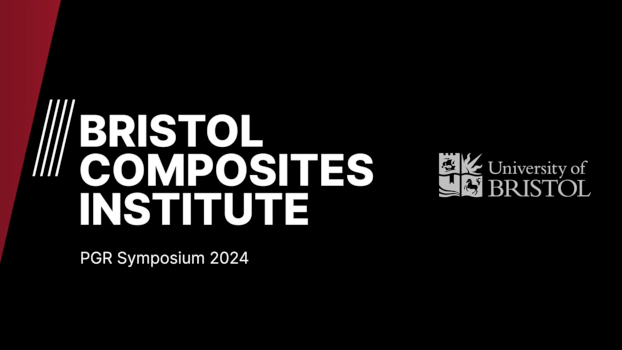
Bristol Composite Institute’s Postgraduate Research Symposium 2024
A strong line up of talks from NextCOMP Researchers featuring Cameron Woodgate and Aree Tongloet were showcased at the Annual BCI PGR Symposium 2024 on the 26th March 2024, which are available on YouTube (links below). The main session was followed up with a quick-fire presentations and a poster session where the breath of studies from the NextCOMP Programme Researchers Eleni Georgiou, Ian Lee, Joe Rifai, and Nic Darras presented their work.
-
Next generation composites for high-performance applications with Dimitrios Bikos
Dr Dimitrios Bikos talks about research into next generation fibre reinforced composite materials, an area of development of particular interest for the transport industry as part of a series of Mechanics of Materials (MoM) Podcasts with Dr Michael Cornish. Dimitris is NextCOMP Team member and is in the Mechanical Engineering Department at Imperial College London, in his MoM podcast he covers diverse areas of interest from the microstructure and properties of chocolate, composite materials, and efficient modelling methodology!
It's great to hear from Dimitris and about his interests and expertise, and his insight into working in multidisciplinary Team.
The Podcast is available on YouTube (h_kDqlEiWrg), Spotify, or Apple Podcasts, 10:04 min. The transcript of the MoM Podcast Episode 4 Dimitrios Bikos is also available (pdf, 123 KB).
-
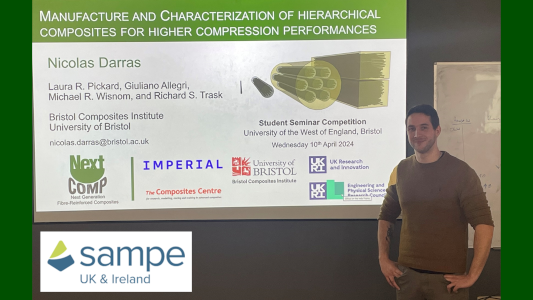
NextCOMP is proud to report that PhD student Nicolas Darras has won the 2024 SAMPE UK & Ireland Student Seminar Competition!
At the event hosted by University of the West of England (UWE) in Bristol, Nic’s presentation entitled "Investigation on the manufacture of hierarchical composites and their mechanical compressive performances" impressed the judges and as a result he will be representing The Society for the Advancement of Material and Process Engineering UK and Ireland Chapter (SAMPE UKIC) at the SAMPE Europe competition which is part of the SAMPE Europe Conference taking place in Belfast in September 2024.
Nic said “Participating in the SAMPE Student Seminar competition was a tremendous experience, allowing me to enhance my presentation skills and shine a light on the novel research within the NextCOMP programme. As one of the UK representatives, I eagerly anticipate the SAMPE Europe conference in September, where I'm excited to showcase our innovative projects on an international stage.”
We wish Nic all the very best for the SAMPE competition and will keep you updated as to how he gets on in the next round!
-
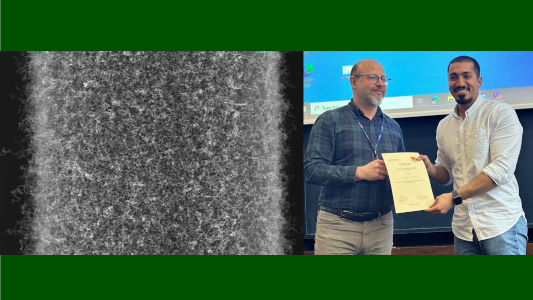
NextCOMP Team member Hassan Almousa scoops TWO awards at Imperial College Materials Postgraduate Research Day!
NextCOMP Team member Hassan Almousa was recently awarded first prize for the best public speaker at Imperial College's Materials Postgraduate Research Day with his presentation “Unlocking the Potential of Carbon Nanotube Grafted Carbon Fibre Composites”.
Attended by more than 50 people, including materials department postgraduate students, lecturers, and professors, Hassan's fantastic and very well-received presentation has generated significant interest for further collaboration.
As if the first prize for the best public speaker wasn't accolade enough, Hassan also won the coveted prize for the best scientific photographic image during the event! We hope you agree that his image is awesome! It showcases "Fuzzy" carbon fibre, an advanced material engineered by directly synthesizing carbon nanotubes onto carbon fibre surface through a bespoke continuous open chemical vapor deposition process.
-
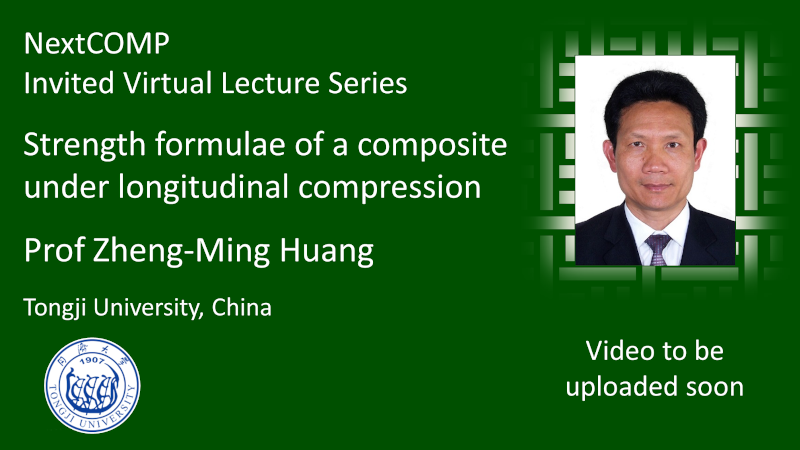
Prof Zheng-Ming Huang "Strength formulae of a composite under longitudinal compression"
= Video will be uploaded shortly =
Abstract: In this talk, I will firstly present an analytical approach to the failures and strengths of a unidirectional (UD) composite under longitudinal compression. Only limited, if not the minimum, input data are required, all of which except for the initial fiber misalignment angle can be measured in advance and following existing standards. The longitudinally dominated load is decomposed into axial, shear and transverse stress components in the misaligned coordinate system. The axial component will cause the fiber to fail whereas the other mainly the shear components will bring the matrix to fail. Whichever occurs the first corresponds to the longitudinal compressive strength. If the fiber’s failure takes place ahead of the matrix’s one, the composite attains the highest compressive strength. Otherwise, a kinking failure is assumed and the compressive strength can be much lower than an expectation. Two issues are critical for achieving the compressive strength evaluation. One is the misalignment angle increment assumed in accordance with the application of the shear component, and the other is the conversion of the homogenized internal stresses of the matrix into the true values. Bridging Model and the matrix true stress theory are the fundamental tools to have achieved the purpose. Then, I will highlight an analyzing procedure for the compressive strength prediction of any fibrous composite. The analysis is begun by subdividing the fibrous composite into a series of slides, each of which contains at most one straight fiber or fiber yarn segment. The latter can be considered as a UD composite in its local coordinate system. The overall true stresses of the fiber and matrix in the fibrous composite are assembled from those of all the slides, based on which the failure detections can be carried out individually for the fiber and matrix. The smallest failure load is defined as the ultimate compressive strength of the fibrous composite.
Bio: Dr. Zheng-Ming Huang got an MS degree in solid mechanics in 1983 from Huazhong University of Science & Technology in China, and a PhD degree in materials engineering in 1999 from National University of Singapore. He was awarded a Cheung Kong Scholars Professor at Tongji University by the Ministry of Education of China in 2002. He has established a number of unique mechanics theories for composites, including a unified elastic-inelastic constitutive theory – Bridging Model, the matrix true stress theory, the interlaminar matrix stress modification method, and the incremental constitutive model for rubber-like elasticity. Based on these theories, a variety of composite failures including interface debonding and laminate delamination has been efficiently addressed with inputs almost all measurable upon existing standards and with no iteration. He has authored or co-authored more than 210 peer reviewed journal papers, 4 books, 9 book chapters and 18 patents. One of his papers has been cited more than 7100 times in Web of Science.
We would like to thank Zheng-Ming once more for the lecture given on 15th April 2024 which was well atteneded as part of our Next Generation Fibre-Reinforced Composites (NextCOMP) Invited Virtual Seminar Series. For those unable to join on the day a video will be uploaded once it has been edited.
Prof Zheng-Ming Huang has also provided his presentation slides (pdf, 48 MB) and calculations spreadsheet (xlsx, 216 KB) for public use with a CC BY-NC-SA license.
-
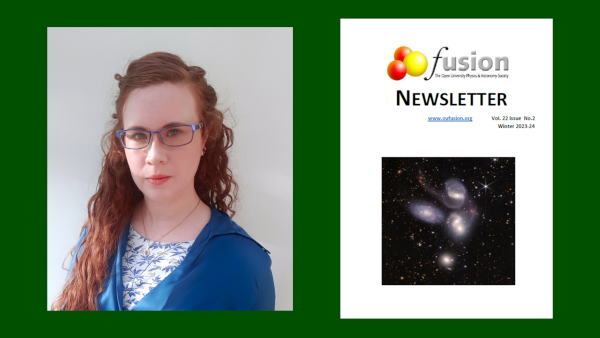
"A physicist engineers bio-inspired composites"
Dr Laura Pickard has been featured in The Open University Physics & Astronomy Society's Fusion Newsletter. The piece titled "A physicist engineers bio-inspired composites" is an article exploring how she has combined her background in Physics with Astrophysics with bio-inspired composites, resulting in working with scientists and engineers at CERN (European Organization for Nuclear Research) at the site of the Large Hadron Collider (LHC), the world's largest and highest-energy particle collider!
-
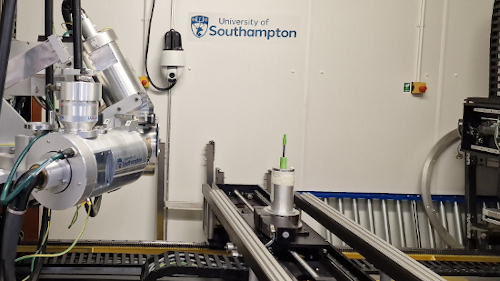
Iheoma describes a technical journey towards exploring in-situ compression testing at the University of Southampton
In January 2024 NextCOMP Team Member Dr Iheoma Nwuzor made an exploratory research trip to University of Southampton. Here’s what she had to say about it:
“My visit to the μ-VIS X-ray Imaging Centre, Faculty of Engineering and Physical Sciences, University of Southampton was amazing. On arrival at the University, the atmosphere buzzed with the enthusiasm of scientific inquiry. The μ-VIS X-ray Imaging Centre was a marvel in itself. The facility boasted different computed tomography scanning machines of different sizes with an array of compression testing rigs designed for various materials, from traditional alloys to advanced composites equipped with state-of-the-art machinery. They adhere to testing standards, which guarantee the accuracy and reliability of the conducted experiments.”
“Having been granted funding via the NCXT (National X-ray Computed Tomography) Free Beamtime Access Scheme funded by Engineering and Physical Sciences Research Council to utilise the facilities at University of Southampton, the aim of this preliminary visit was to discuss and explore different ideas around a variety of test methodologies for my sample geometry to allow for a successful in situ compression testing campaign. In collaboration with University of Southampton colleagues we discussed the various challenges and benefits and devised a plan for the forthcoming work.”
“It was an illuminating and enlightening experience at the University of Southampton which reiterated to me the vital role such facilities play in the advancement of Material Science and Engineering. I am excited for the next stage of our work together!”
-
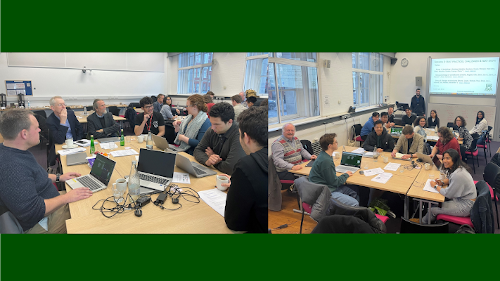
NextCOMP Workshop on fracture toughness
On Wednesday 12th January 2024, approximately 30 academics and researchers from NextCOMP met at Imperial College London for the 5th NextCOMP workshop. Building on the success of previous workshops focusing on Initiation, and Propagation of compressive failure of composites, the Team gathered to explore the significance of measuring the fracture toughness in unidirectional fibre-reinforced unidirectional composites.
The scene opened with the first session exploring how an experimental and modelling campaign of measuring the fracture toughness aligns with NextCOMP’s primary objective “Improving the compressive strength of unidirectional fibre-reinforced composites”. Following Professor Silvestre Pinho’s insightful talk on interlaminar compression and the challenges around measuring a representative value of interlaminar fracture toughness, the Team openly discussed how experimental and modelling concepts from the proposed pre-workshop reading material could be exploited by NextCOMP.
Interactive table discussions then followed, the Team was asked to discuss and report on target questions regarding the composite’s failure mode, mode of fracture toughness, and the composite length scale that NextCOMP should be focusing on. In the last session the attendees switched up the tables, this time based on the length scale relevant to their work package which led to stimulating discussions. The tables were grouped as follows: Modelling and Testing, Design of Constituents, and Design of Structures. The table discussions were led by the researchers and the attendees were tasked to select the best concepts, comment on possible challenges, and identify future steps.
The workshop concluded with valuable feedback and the adoption of best practises. The 5th NextCOMP workshop was another success, fostering stimulating discussions, giving the opportunity for all attendees to pitch in ideas, and identify the best ways to tackle the challenges behind measuring the fracture toughness of composites.
-
Dr Oriol Gavaldà Diaz "Micro and nanomechanical testing of ceramics and composites"
Abstract: New structural materials rely on the micro- and nanoscale design of their microstructure to achieve the desired performance. A classic example of this can be found in long fibre reinforced composites used in aerospace, automotive or energy generation, where fibre-matrix interfaces are customised to achieve the desired strength and toughness. However, understanding the properties of these nanoscale features and their effect to the bulk failure is challenging. In this talk, I will be presenting the small-scale testing (from micro to nanoscale) that we have developed over the recent years to better understand the failure of materials and allow the design of new microstructures. I will show how we are able to test a variety of composites and ceramics and obtain nanomechanical properties such as toughness, strength and friction of fibre-matrix interfaces.
Bio: Dr Oriol Gavaldà Diaz is lecturer in the department of materials at Imperial College London (from January 2024). Oriol obtained his PhD working within the Rolls Royce University Technology Centre (UTC) in manufacturing at the University of Nottingham, looking at the behaviour of ceramic composites during a material removal process. Before re-joining the University of Nottingham as a transitional assistant professor, Oriol spent over three years as a postdoctoral research associate in the Department of Materials at Imperial exploring and developing a variety of micro- and nano-mechanical testing techniques. Currently, his main interests involve understanding the failure of materials via small scale testing (micro and nano) and advanced characterisation techniques to feed the design of the new generation of ceramic and composite materials.
We would like to thank Oriol once more for the lecture given on 10th January 2024 which was well atteneded as part of our Next Generation Fibre-Reinforced Composites (NextCOMP) Invited Lecture Series.
The recorded event is available on YouTube (0BnDTcFOruY) 51:33 min
-
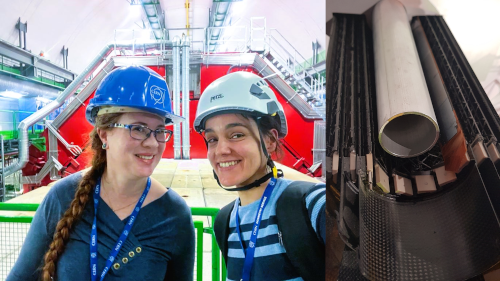
Photo Credits: (left image) María Soledad Molina González and (right image) Dr Laura Rhian Pickard
Laura visits the Large Hadron Collider and presents at CERN
Following the successful Workshop in Composites for High Energy Physics held at Bristol Composites Institute in November, Dr Laura Rhian Pickard visited CERN (Conseil Européen pour la Recherche Nucléaire or in English European Council for Nuclear Research) in December 2023 to present at the DRD8 Community forum on Tracking Detector Mechanics. Dr Pickard’s presentation “Composites for Tracking Detectors” was well received, by colleagues from CERN and elsewhere in the high energy physics community.
This visit was well timed as the Large Hadron Collider (LHC) beamline went into winter shutdown, allowing safe access. Dr Pickard visited ALICE - A Large Ion Collider Experiment. ALICE observes the particles produced when fast travelling lead ions collide and produce quark-gluon plasma akin to the early universe, using this information to better understand the evolution of our universe. Like all experiments within the LHC, ALICE needs composite structures to hold and cool her particle detector electronics. Very small, fine, precisely manufactured trusses sit in concentric rings around the beamline where the collisions take place, holding these detectors, with larger rings further out (shown in the figure insert).
Special thanks to María Soledad Molina González (pictured right) for organising the visit to ALICE, pictured with Dr Pickard (pictured left).
During this visit discussions on furthering the collaboration between Bristol Composite Institute, National Composite Centre, and CERN continued, with all parties keen to work together and excited to see what the future may bring. Watch this space for more information when we have it.
-
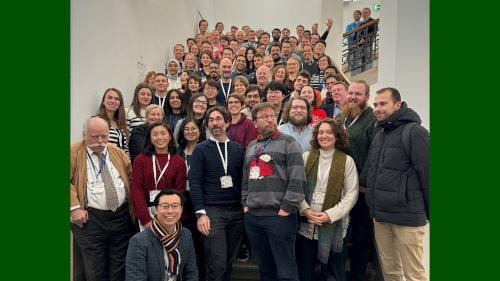
NextCOMP at 8th International PaCE X-mas Symposium
NextCOMP were in strong numbers for this year’s 8th International PaCE X-mas Symposium hosted this year by Professor Alexander Bismarck (University of Vienna, Austria), Professor Eero Kontturi (Aalto University, Finland), and Koon-Yang Lee (Imperial College London, UK) between 7th-8th December 2023 at the University of Vienna. “Pints of Science” opened the proceedings and Dr David Anthony (Imperial College London, UK) gave a talk on “Carbon nanotube-grafted quartz fibers as piezoresistive reinforcement elements” as part in an extended session featuring Dr Lee and Dr Andreas Mautner (BOKU, Austria). It was the first year that Professor Ian Hamerton (University of Bristol, UK) was invited and he gave a talk on “Development of benzoxazine nanocomposite blends for space applications”, and NextCOMP’s Principle Investigator Professor Milo Shaffer (Imperial College London, UK) presented “Multiscale and multidimensional characterization of carbon nanomaterials and nanocomposites”. Mr Hassan Almousa (Imperial College London, UK) also joined in with a poster titled “Can carbon nanotube grafted carbon fibres improve compression performance?” as did Ms Diana Bratilescu (University of Vienna, Austria) presenting "High performance amorphous polymer composites" in the largest session yet held in the series with over 35 posters featured.
There was plenty of fun (anyone for making batteries made using lemons and potatoes?) and science with an array of talks spanning a wide range of topics from cellulose composites stopping bullets, and 3D printing engineered living materials, to beer drinking and the promotion of materials engineering!
-
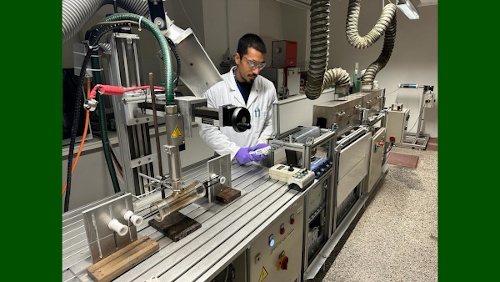
NextCOMP continued collaboration with University of Vienna
NextCOMP Team members Mr Hassan Almousa and Dr David Anthony took up the opportunity to use the large-scale continuous equipment at the University of Vienna collaborating with Alexander Bismarck, Diana Bratilescu, and the Polymer & Composite Engineering Group in the Institute of Materials Chemistry & Research. They were able to prepare carbon fibre samples by depositing a catalyst as part of the process to make hierarchical fibres, and excitingly created their first thermoplastic carbon fibre tape composites. More exciting outcomes to follow!
-
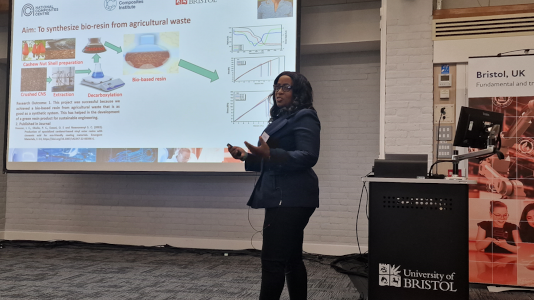
NextCOMP at BCI/NCC Annual Conference
Dr Iheoma Nwuzor recently presented at the BCI/NCC Annual conference, where leading experts and researchers gathered to explore and exchange groundbreaking ideas in Composites of the Future: Tomorrow's Materials & Applications on the 16th of November 2023 at the Wills Hall Conference Centre. The conference provided a platform for in-depth discussions and the presentation of cutting-edge research. In her talk, "Promoting the future of innovative sustainability in composite materials for environmental impact reduction", Dr Nwuzor focused on sustainable composite materials. Her thoughts on sustainability and the most recent advancements in sustainable composite materials enthused the audience.
Reflecting on her experience, Dr Nwuzor expressed enthusiasm about future collaborations and the potential for further advancements in sustainable composite materials. Undoubtedly, the experience gained from the conference will have a positive impact on her current research projects with NextCOMP which will contribute to the larger academic and professional community.
The conference also included a poster from Dr Laura Pickard who presented her work on “Bioinspired, Pultruded Rod Based Hierarchical Composites”.
It was a busy, well attended and interesting conference. Read more at 2023 BCI & NCC Annual Conference – Bristol Composites Institute Blog.
-
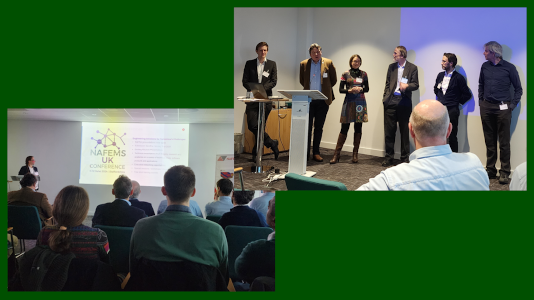
NextCOMP Phd students Sudirja and Xuanye Xu attend NAFEMS seminar on Practicalities of Analysing Composite Materials
In a gathering of industry experts and researchers, the National Agency for Finite Element Methods and Standards (NAFEMS) seminar on the "Practicalities of Analysing Composite Materials" held on 5th December 2023 at the Lloyds Bank Advanced Manufacturing Training Centre in Coventry, was a day filled with groundbreaking presentations and discussions on the challenges and advancements in the realm of composite material analysis. Bristol-based NextCOMP PhD students Sudirja and Xuanye Hu attended the all day seminar which also featured presentations by two NextCOMP academics Professor Michael Wisnon and Professor Silvestre Pinho. This news article was written by Sudirja.
The event kicked off with a warm welcome from Dr Olivia Stodieck (Dapta Ltd.), setting the stage for the day's proceedings. Dr Stodieck introduced NAFEMS, emphasizing its integral role in engineering simulation development, particularly in the domain of composite analysis. Attendees were also briefed on upcoming events and were given a glimpse into the diverse topics on the horizon, ranging from robust design and analysis to the consideration of multidisciplinary designs, and optimization approaches.
The seminar's first presenter, Professor Michael Wisnom (University of Bristol) NextCOMP Team memeber delved into "Important issues in modelling the response and failure of fibre-reinforced composites" and highlighted crucial challenges in simulating composite failure, underscoring the orthotropic nature of composites. His presentation emphasised the importance of material properties, through-thickness properties, non-linearities in fiber direction, and the validity of homogeneous properties. He also shed light on the significance of addressing issues related to delamination in composite materials.
Lydia Cabezudo Carrascal (Airbus Defence & Space) took the stage next, presenting on the "Optimisation of carbon fibre reinfinforced polymer lay-ups for spacecraft honeycomb panels". Her presentation focused on the application of honeycomb structures to achieve lightweight aircraft components. Lydia shared details of progress in honeycomb research, offering insights into how these structures contribute to the aviation industry's pursuit of lightweight yet robust components.
The third presentation, by George De Bolla (Jaguar Land Rover), centered around "Electromagnetic simulations for composite materials". George highlighted the use of lattice structures to advance electromagnetic research and elaborated on numerical simulation methods such as finite-difference time-domain, finite element method, and method of moments for solving electromagnetic problems.
Following a break for lunch and networking, the post-lunch sessions commenced with Professor Stephen Hallett (University of Bristol), who addressed "Simulating composites manufacturing processes". He stressed the importance of process modeling in solving problems cost-effectively, reducing the need for extensive physical trials, and enabling the design of more manufacturable parts.
Another familiar face from the NextCOMP Academic Team, Professor Silvestre Pinho (Imperial College London) then took the stage, presenting on the "Finite element modelling of very large composite aircraft wings". His research focused on bridging small-scale simulations with large-scale counterparts, utilising effective methods to provide faster and more accurate data for larger simulations.
The seminar's concluding presentation was delivered by Eoin Simon (National Composites Centre), who discussed "Simulation tools developed for next generation wing production". Eoin introduced the National Composites Centre as a key player in composite research and elaborated on the facilities available to assist engineers and researchers in analysing and optimising composites with advanced technologies.
The day wrapped up with a stimulating discussion session where presenters answered questions from participants. Notably, a question about the use of artificial intelligence (AI) in composite simulations revealed a unanimous acknowledgment of AI's potential for enhancing simulation efficiency, tempered by the current scarcity of datasets for composite simulations. Another query related to the importance of material properties in simulation research received unanimous agreement from all presenters.
The event not only showcased the cutting-edge developments in composite material analysis but also provided a platform for fruitful discussions and networking, leaving attendees inspired and enriched with valuable insights. The Practicalities of Analysing Composite Materials seminar undoubtedly contributed significantly to the ongoing dialogue in the dynamic field of composite material analysis. Xuanye and Sudirja thoroughly enjoyed attending and found it incredibly useful for their ongoing work as part of NextCOMP.
-
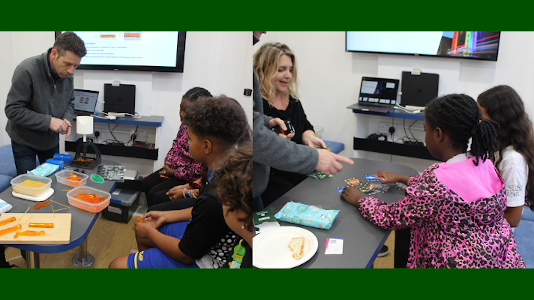
Bringing Composites to Street Youth Work
For the last few months the NextCOMP Team have been working on with partners Young Bristol and University of Bristol Public Engagement on an exciting outreach and engagement project. Funded by FUTURES, their co-produced “Discover Composites” workshop has been taken out on the road, delivered on the streets of Bristol through the Young Bristol Youth Club on Wheels programme. Composite related interactive activities involving jelly, spaghetti, eggs, clay, and chocolate have all been designed to inspire the next generation of composite engineers!
-
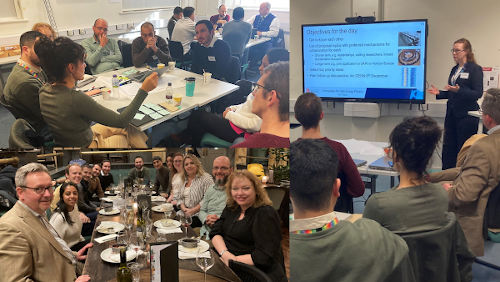
Lively discussions at the Composites for High Energy Physics Workshop
Recently we were delighted to host several colleagues from CERN (Conseil Européen pour la Recherche Nucléaire or in English European Council for Nuclear Research), and the National Composites Centre (NCC) at Bristol Composites Institute (BCI), who joined a full day workshop discussing Composites for High Energy Physics which was organised and delivered by NextCOMP Senior Research Associate, Dr Laura Pickard and was funded by Bristol International Research Collaboration Activities (BIRCA). CERN physicists and engineers use the world’s largest and most complex scientific instruments to study the basic constituents of matter-fundamental particles, and have a growing interest in harnessing the many benefits of using composite materials in development of their state-of-the-art facilities.
Kicked off by a tour for CERN colleagues of the extensive NCC facilities, and following a welcome from Professor Ole Thomsen, Co-Director of BCI, workshop attendees from across BCI, NCC, and CERN spent the day discussing three important areas of research of interest to all parties which were cryogenics and extreme environment, truss structures and microvascular channels and cooling systems. Presentations on these themes from CERN, NCC colleagues, and BCI academics set the scene for very productive and useful discussions which provided further knowledge exchange opportunities as well as time to plan and prioritise ideas for future collaboration. Further presentations highlighted the numerous mechanisms available for collaboration across all the organisations including potential sources of funding for future work. CERN and NCC colleagues undertook a tour of the BCI lab during the working lunch which included observing some members of BCI demonstrating their relevant work, which together with the earlier tour of NCC facilities helped to inspire new ideas and thoughts about what might be possible for future work. A working dinner followed the days activities which allowed for more discussions, and CERN colleagues also attended the BCI and NCC Annual Conference which took place the next day.
At the close of the workshop, when summing up the discussions, Dr Pickard noted the wealth of collaboration opportunities available and the many ideas for future work which had come to light as a result of the workshop. Dr Pickard said, “With thanks to funds from BIRCA, we have enjoyed a fantastic day of fascinating and very productive conversations. Bringing together CERN colleagues with key BCI academics and NCC colleagues has been incredibly useful and on all sides, has confirmed our strong desire to work together to build further collaborations.”
Dr Diego Alvarez Feito of CERN commented, “I would like to thank the colleagues from BCI and NCC for organising a great workshop! It was a very valuable experience with plenty of enriching discussion, which I believe lays a strong foundation for exciting future collaborations.”
Laura will represent BCI at the forthcoming for R&D collaboration on Tracking Detector Mechanics on Weds 6th December where she will meet other CERN colleagues as well as those involved in a wider consortium.
-
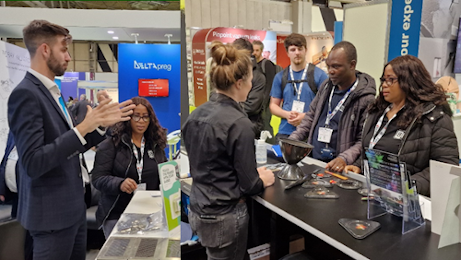
NextCOMP Team Member Dr Iheoma Nwuzor attends Advanced Engineering 2023!
Research Associate Dr Iheoma Nwuzor enjoyed experiencing the innovation, technology, and industry best practices on display at Advanced Engineering 2023, held at the NEC in Birmingham, UK. An interesting and insightful event, Iheoma crisscrossed and engaged with professionals, peers, academics, industrial and business experts, industry leaders, and potential business partners. Benefitting from knowledge exchange through a series of seminars, presentations, and keynote speeches by experts, this event provided insightful information about opportunities, challenges, and trends in the current industrial sector.
The event showcased state-of-the-art and innovative technologies that encompass areas such as composite manufacture for various industrial applications like aerospace, automobile, etc, textile technologies, aerospace manufacturing, automobile manufacturing, additive manufacturing, 3D printing, artificial intelligence, robotics, sustainable materials, and digital twin technology.
Iheoma said "This was an excellent opportunity for me to engage with a wide range of stakeholders and see lots of different potential industrial applications for our work in NextCOMP. Inspired by what I have seen I am looking forward to sharing what I have discovered at Advanced Engineering with colleagues"
-
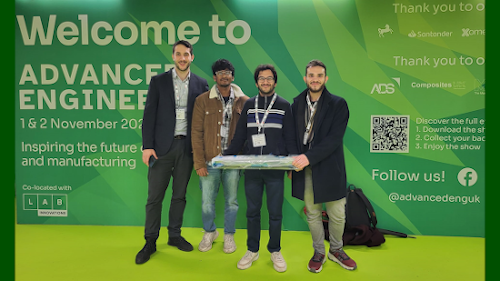
NextCOMP PhD Student Nicolas Darras competes in the SAMPE challenge at Advanced Engineering!
SAMPE UKIC (Society for the Advancement of Material and Process Engineering UK & Ireland Chapter) Design, Make, Test Competition Launch was hotly contested at this year’s Advanced Engineering 2023 event held at the NEC, Birmingham, UK. Nicolas Darras along with three Bristol Composite Institute (BCI) team mates Ege Arabul, Sutharsanan Navaratnarajah, and Umeir Khan enthusiastically rose to the challenge which was launched 20th September, with the finals taking place several weeks later on 2nd November.
The student teams from across the UK were tasked to design and manufacture a bridge made from composite materials using a woven hybrid flax/carbon fibre prepreg. Several design parameters were essential to meet such as the dimensions: a minimum of 625 mm long and a maximum of 60 mm high. The bridges built by each of the teams were tested in a 3-point bend test on an Instron machine amongst a throng of onlookers!
Several criteria were assessed by the judging panel such as the load-to-weight ratio, the originality of the design, and a 1-minute technical video that explained the decisions made by the teams for the design and manufacture of their specimen.
Unfortunately, Nic and his colleagues didn't win the competition, but it was a fantastic opportunity to work together with other BCI students and a unique chance to be part of the Advanced Engineering event!
Nic said, "It was really fun thinking about, designing and making the composite bridge. On the day we were quite nervous and excited, and it was a brilliant experience for all of us".
-
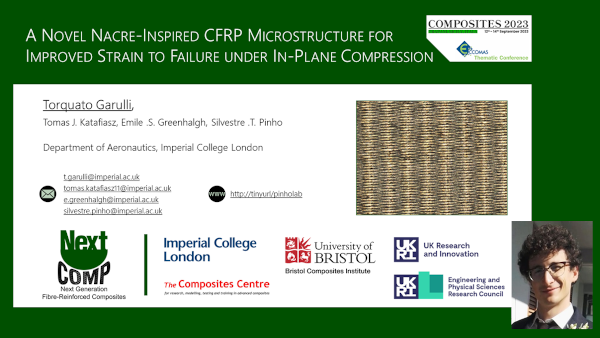
Torquato presents at Composites 2023
Composites 2023 was held 12th-14th September in Trapani, Italy. A thematic conference of the 9th European Congress on Computational Methods in Applied Sciences and Engineering (ECCOMAS) series, with a focus on the mechanical response of composite materials. Torquato presented “A novel nacre-inspired CFRP microstructure for improved strain to failure under in-plane compression”.
The conference mainly focused on theoretical and numerical modelling, prediction of the performance of composite components, and also covered experimental validation towards challenging industrial applications. A great social programme worked extremely well to foster a positive environment, productive discussion, and friendly interactions. Torquato met many colleagues from Imperial College London as well as engaging with people from an array of countries across the world including Spain, Portugal, Belgium, USA, Italy, and further afield, highlighting the truly wide ranging interest in the field.
-
Dr Frédéric Laurin "Determination of the longitudinal compressive strength of some laminated composite materials using various classical and innovative tests"
Abstract: The present study proposed a critical analysis of the available existing tests in order to determine the longitudinal compressive strength of various unidirectional plies. The (i) standard compressive tests on uni-directional (UD) plies, (ii) additional bending tests on UD plies and (iii) an alternative tensile test on a specific lay-up that fails by fibre kinking were considered for different composite materials. The composites considered are (i) a classic aerospace carbon/epoxy material with standard ply thickness, (ii) another carbon/epoxy material with thin plies in order to study the effect of ply thickness on the strength and finally (iii) a carbon/thermoplastic material to highlight the role of the matrix on the strength studied. All these tests were highly instrumented in order to accurately determine the failure scenario and to ensure that the relevant failure mode was obtained.
In order to analyse such tests (compression, tension and flexure), a micromechanical model, associated with a damage model defined at the ply scale, has been proposed. It has been shown that the variation in the longitudinal compressive strength obtained at the UD ply scale for tensile and flexure tests is consistent when the fibre kinking is considered at the microscopic scale, which appears to be the relevant scale of analysis. In addition, the influence of the position of the plies through the thickness has also been considered for compression tests and can again be explained by the use of a micromechanical modelling.
We would like to thank Frédéric once more for the lecture given on 22nd November 2023 which was well atteneded on our first Next Generation Fibre-Reinforced Composites (NextCOMP) Invited Virtual Seminar Series.
The recorded event is available on YouTube (-wTUgYPkAJE) 57:05 min
-
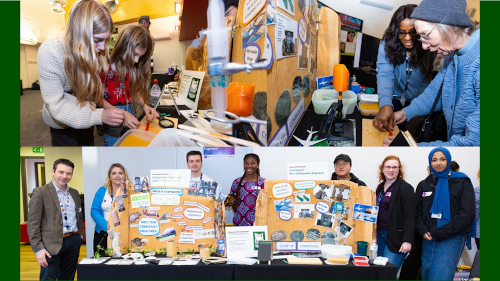
Photo Credits: Jon Rowley jonrowleyphotography.com
FUTURES Up late at SS Great Britain: Fantastic Festival Fun for NextCOMP and collaborators!
The NextCOMP Team and BCI collaborators had a fantastic time on Friday 29th September 2023 at Up Late @ S.S. Great Britain, one of the events held as part of FUTURES organised by the University of Bristol Public Engagement Team, which NextCOMP attended for the second year running. Visitors of all ages and from across the city flocked to the Bristol harbourside to engage with researchers from all disciplines about their work, and visit the fantastic SS Great Britain ship at the same time! Our stand “Crushing it: Be a Composites Engineer” included some interesting naturally occurring "composite conversation starters" such as bamboo, sea glass sponges, and shells, as well as our composites creatures and composite timeline which shows the many and varied uses of composites throughout the ages! The NextCOMP Crusher was busy all night, with visitors vying to achieve the highest strength composite made from jelly and pasta, and the Team loved chatting with all the visitors about composites and our research.
A huge thanks to all NextCOMP Team members involved including; Prof Richard Trask, Prof Ian Hamerton, Jo Gildersleve, Dr Laura Pickard, Dr Iheoma Nwuzor, Cameron Woodgate, Xuanye Hu, Sudirja, as well as new Composites Science, Engineering and Manufacturing Centre for Doctoral Training (CoSEM CDT) student Mary Sintim Donkor, and undergraduate aerospace engineering student Radia Shire.
Photo Credits: Jon Rowley jonrowleyphotography.com
-
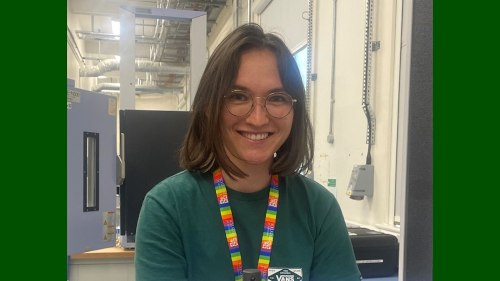
From IMT Mines Albi to Bristol Composites Institute: Masters student Laurie-Anne's internship with NextCOMP
- "This internship was really fulfilling and enriching...I had a great time during this internship. I learned a lot both on a personal and professional level."
- - Laurie-Anne Entzmann
Masters Student Intern
NextCOMP were delighted to host Laurie-Anne Entzmann, a Masters student from IMT Mines Albi-Carmaux (École des mines d'Albi-Carmaux) for several months April-August 2023. Laurie-Anne's work focused on the development of polymer formulations leading to novel architectures designed to improve the compression properties of reinforced polymer composites. Working with Prof Ian Hamerton, Dr Rachel Board, and Dr Kirk Willicombe in resin systems, and as part of the wider NextCOMP Team, Laurie-Anne's work will be further developed in the forthcoming months.
Of her time with NextCOMP Laurie-Anne told us, "I liked being part of a team that supports and help each other, I had asked for a hand many times and I could always find people willing to help me. It gives also a lot more sense to what we are doing as it directly benefits to one another. The fact that every work package is linked to each other allowed me to have a general overview of what my work will contribute to. It also gave me the opportunity to discover many research fields of composite materials."
It was a pleasure to host Laurie-Anne who was a very valued team member during her time with us. She has now taken up another fantastic opportunity working in Japan and we wish her all the best for her future exciting endeavours!
-
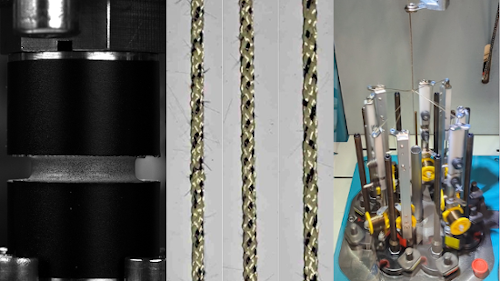
Three undergraduate summer interns join NextCOMP
It was a real pleasure to host three undergraduate summer interns at the University of Bristol who for 7-8 weeks worked in the NextCOMP Programme exploring a range of different challenges.
We are very grateful for funding from the Faculty Industrial Liaison Office (ILO) internship scheme which supported Curtis Wong and Abdulrahman Al Hammami.
Abdul (supervised by Dr Bohao Zhang) worked on the investigation of the effect of shear strain rate on the shear behaviour of polymer matrix for carbon fibre reinforced composites and throughout the course of his internship discovered that the yielding of polymer matrix was influenced by higher shear strain rates, which can be beneficial for the finite element modelling of composite materials subjected to compression (image left).
Supervised by Dr Laura Pickard, Curtis focused his work on improving the compressive performance of pultruded rods in which he explored using different overbraiding configurations and a range of different materials (image centre).
We also thank the Henry Royce Institute for funding work undertaken by our third summer intern, Charlie Sharp as part of the Royce Undergraduate Internship Scheme. Also supervised by Laura, Charlie's project investigated structural natural material (image right), with a focus on the efficacy of natural materials for use in composite structures, particularly off shore wind turbines. As part of his internship Charlie delivered a live presentation at the Henry Royce Institute Internship conference which took place on 1st September 2023 which was an enjoyable event and an excellent development opportunity.
Throughout their time with NextCOMP our summer interns were given several opportunities to present their work and discuss their technical challenges with the wider NextCOMP Team. This lead to lots of discussion and they made some very interesting discoveries some of which will be developed further and we really enjoyed having them as part of the Team!
The last word goes to one of our summer interns who said "The most positive thing about my summer internship with NextCOMP is the experience I’ve gained with composite manufacturing and academic research... I’ve gained a better understanding of what it’s like to conduct research in the field of composite manufacturing."
-
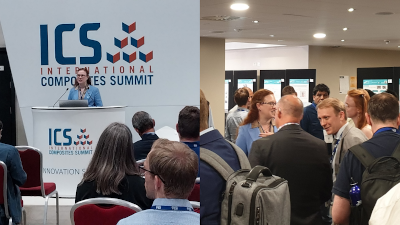
Photo Credits: (left) Future Composites Manufacturing Research Hub, and (right) Composites UK
September scoop: Laura wins presentation prize at Composites Hub Day and presents at ICS
Dr Laura Pickard was delighted to be awarded the runner up best presentation award for her quickfire talk focused on human-robot collaborative manufacturing of “thick ply” prepreg sandwich systems. The EPSRC Future Composites Manufacturing Research Hub Annual Open Day 2023 event was held on 6th September, in Milton Keynes organised by CIMComp.
Her poster and talk generated a lot of interest from the audience about the hierarchical composite concepts, as well as the cobotic layup, generating many interesting and productive conversations as a result, as well as her walking away as a prize winner!
It was a very busy week as she also presented at the International Composites Summit 2023, also held in Milton Keynes at the Marshall Arena across 6th-7th September.
An excellent opportunity to engage with industry, Laura's presentation at ICS on 6th September focused on her work in bundle systems and overbraiding. The summit was a busy event and many new contacts were made. Laura also enjoyed visiting and chatting with many of the exhibitors at this popular industry focused event.
It was a very successful couple of days. Laura spent the prize money on treats and a toy for her dog Lola who was extra happy to see Laura on her return from her trip!
-
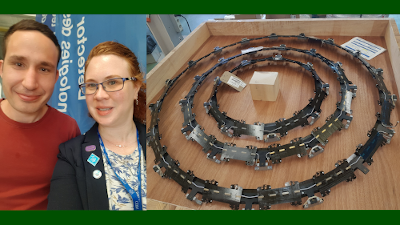
CERN-tastic collaboration!
In June 2023 Dr Laura Rhian Pickard spent a week at European Organization for Nuclear Research - CERN as part of her International Strategic Fund project “Composites Solutions for High Energy Physics”, which applies a NextCOMP development to a real-world problem. The results are very promising and a paper has been submitted to a leading journal. Dr Pickard was invited to deliver a seminar during her time at CERN which was very well attended (slides are linked here), highlighting work devleoped in NextCOMP and the Bristol Composites Institute (BCI). Work is ongoing to further develop this collaboration, including a workshop which will take place in Bristol in November.
- "I was delighted when the team from CERN approached me about using my work, developed under NextCOMP, to solve a challenge for the next generation of Large Hadron Collider upgrades. Having started as a physicist the opportunity to contribute to this was a dream come true, bringing together my determination to do truly useful work in composites and the fascination of furthering our understanding of the universe. The results to date are great and have a wide range of potential applications beyond high energy physics. I had a great time during my visit and we identified multiple key areas for future collaboration between CERN and BCI, which we are now working on making a reality. Thank you to Mathéo, Diego, Francois, Soledad and everyone in the CERN composites team for a great visit and I look forward to continuing our work."
- - Dr Laura Pickard
Laura's work with CERN was made possible by her recent funding from the Career Development programme at University of Bristol. Following her successful application to the initiative, Laura undertook a three month sabbatical earlier this year enabling her focus on her career development, including attending dedicated workshops, and writing retreats to enable her to plan and write new research proposals and publications. Laura has used the time to great effect, with the CERN collaboration being one such example. NextCOMP were delighted that Laura was awarded this Career Development opportunity and we look forward to supporting Laura's future collaborative work with CERN and other partners in the forthcoming months!
-
Professor Leif Asp "Realisation and performance of carbon fibre based structural battery composites"
The 2023 NextCOMP Annual Lecture was delivered by Professor Leif Asp on 23rd August 2023, who is a member of the External Advisory Board for NextCOMP. This talk introduces one type of structural battery composites made from carbon fibre reinforced electrodes. Here, the negative electrode is made from PAN-based carbon fibres distributed in a structural electrolyte [1], where the carbon fibre performs three functions: acting as reinforcement, active electrode material (hosting lithium) and electron conductor. The positive electrode also utilises carbon fibres in its construction. By coating a lithium iron phosphate (LFP) rich layer onto the fibre surface the fibre acts as current collector and reinforcement. The electrodes are separated by a thin veil and impregnated by a structural electrolyte.
The effects of lithiation of the carbon fibre negative electrode on the mechanical performance of the structural battery composites are presented and discussed in depth along with manufacture and performance of the positive electrode and the structural battery composite full cell.
We would like to thank Leif once more for the lecture which was well received by all those who attended in-person and virtually.
The recorded event is available on YouTube (keZFfIbpR9U) 46:39 min
-
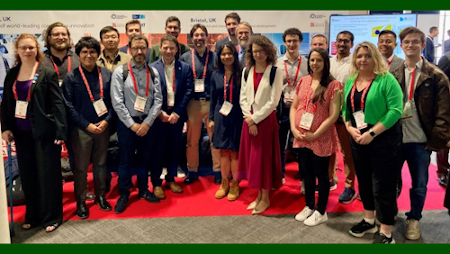
ICCM23: Special Session on Understanding and Improving Longitudinal Compression Strength
The NextCOMP Team are delighted to have organised a large special session at 23rd International Conference on Composites Materials (ICCM23), Belfast, UK featuring 28 speakers across eight sessions in three packed days of talks on "Understanding and improving longitudinal compression strength" held at the ICC Belfast International Convention & Exhibition Centre in Hall 2A (Tuesday 1st August to Thursday 3rd August 2023).
A fantastically engaged audience, with thought provoking questions from leading academics and industrial partners, it was an insightful set of sessions with many new connections forged and fruitful discussions had. The sessions covered the full range of scientific challenges in compression from modelling, through matrices, fibres, ply level systems, bundle systems, and experimental characterisation, in line with our NextCOMP principles to examine and develop hierarchical solutions to inspire the next generation of composite materials.
Thanks to all our amazing speakers who made it such a successful and enjoyable event; Leif Asp, Soraia Pimenta, Lars Pilgaard Mikkelsen, Tomas Katafiasz, James Pheysey, Michael Wisnom, Ian Lee, Francisca Martínez Hergueta, Gangadhara Prusty, Masahito Ueda, David Anthony, Mark Harriman, Torquato Garulli, Frédéric Laurin, Alexander Bismarck (deputize by Milo Shaffer), Rupam Gogoi, Declan Carolan, Laura Pickard, Dimitrios Bikos, Takayu Nishioka, Nabeel Safdar, Charlie Shaw, Russell Varley, Bohao Zhang, Philip Withers, Gustavo Quino, Cameron Woodgate, and Aree Tongloet.
NextCOMP also appreciates the chair and co-chairs for hosting the sessions; Silvestre Pinho, Richard Trask, Gustavo Quino, Rachel Board, Milo Shaffer, Bohao Zhang, Paul Robinson, Laura Pickard, Michael Wisnom, Dimitrios Bikos, David Anthony, Torquato Garulli, Soraia Pimenta, Rupam Gogoi, and Tomas Katafiasz.
We would like to thank Ignaas Verpoest, Emeritus Professor at the Composite Materials Group of the Department of Materials Engineering, KU Leuven, and Yentl Swolfs, Research Professor and the coordinator of the Composite Materials Group at KU Leuven for their positive worlds of encouragement in their final remark on their Review of the International Conference on Composite Materials (ICCM), Belfast 2023 for JEC “…the series of sessions on compressive strength of composites, jointly organised by Imperial College London and the University of Bristol. The lectures not only covered research outcomes of their large joint project NextCOMP but also invited researchers from other universities to present their work on the compression strength of composites, an often-under-estimated challenge for composite applications. Combining presentations from a large research project with others from outside the team seems to be a concept to be followed up on in future ICCMs”, for the full article please visit the JEC Composites News Article.
-
Video snapshot on the determination of dilation angle of polymers
The experimental characterisation of dilation angle of polymers is fundamental to the understanding their compressive performance. In conjunction with a journal article in Polymer Testing a snapshot video of the study carried out by Dr Gustavo Quino and the Team can be found on YouTube (kKQ6c2ByXQ0) 00:29 min.
-
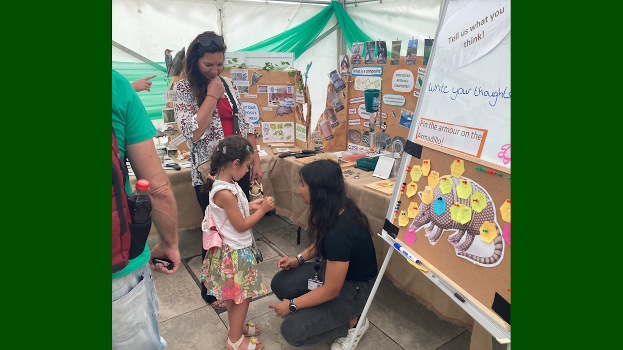
NextCOMP Fun at the Festival of Nature!
On 17th and 18th June, the NextCOMP Team took part in the Festival of Nature organised by Bristol Natural History Consortium at Millennium Square in the centre of Bristol.
An incredibly busy Millennium Square, checkered with multiple marquees, became the hub of many fascinating nature-related discoveries. Large numbers of people attended the two-day event, from all walks of life to engage with the different activities.
The NextCOMP "Woodpeckers and Wind Turbines: How nature inspires novel materials" stand attracted a lot of attention, with visitors keen to uncover facts about and vote for their favourite "Composite Creatures" (spoiler: it was the armadillo). Visitors enjoyed interacting with artefacts such as bamboo, shells, and natural fibres as well as some manmade carbon fibres and plies. A timeline of composites through the ages introduced visitors to the many ways humans have been harnessing the power of composites since their inception to their multiple uses in society today.
The "NextCOMP Crusher" was in constant use, with visitors all struggling to create the strongest composite they could make from a jelly beam and using just two strands of pasta for reinforcement. Once constructed, attendees of all ages tested their jelly/pasta composite by applying weights until failure. This year’s Festival of Nature saw the record broken, with a massive 1 kg being achieved! Supported by our fantastic University of Bristol Public Engagement colleagues, it was a brilliant opportunity to meet and converse with curious and engaged local people.
NextCOMP's Prof Richard Trask said "What an amazing positive outreach event to engage with all ages. The Festival of Nature brings wonderful conversations around the benefits of fibre reinforced composites for society now and what we need to do for a more sustainable future. Who can resist the composite crusher – a simple test, and yet both the ‘established’ and ‘budding’ engineers and scientists are all vying to do the impossible… create a structural composite from jelly and spaghetti! Cracking fun!”
-
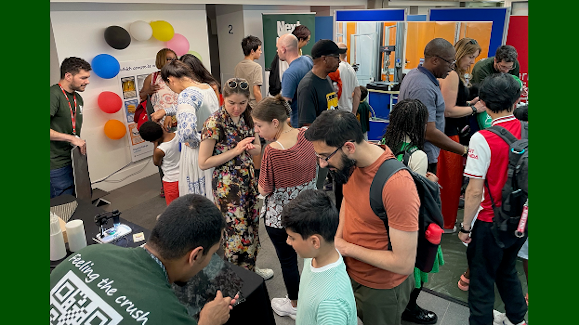
NextCOMP at The Great Exhibition Road Festival
NextCOMP hit the huge Great Exhibition Road Festival 2023 over the weekend of 17th to 18th June and totally crushed it! The Team had the chance to enthuse thousands of interested visitors about the joy and importance of composites. Attendees got to handle real composite parts, including from a Lamborghini and a fighter jet, before attempting their own model systems. Jelly beam matrices were stiffened with spaghetti reinforced before testing to destruction. The winning designer managed to hold 1.4 kg – and even put up a cash prize for anyone who could beat him (they couldn’t). The structure of the broken jelly beam was compared to the microstructure of carbon fibre epoxy fracture surfaces using a digital microscope with a fresh real human hair as a scale bar (some of the team are balder than they were before!).
The Teams efforts were highlighted by the organisers in a Tweet.
It was non-stop action for two full days over the weekend; thanks to all the support from the GERF Team, and the effort from the EPSRC-funded NextCOMP crew including Hwei Lin Khoo, Charlie Shaw, Hassan Almousa, Rupam Gogoi, Dimitrios Bikos, Gustavo Quino, Silvestre Pinho, Soraia Pimenta, and Milo Shaffer.
For more details on future The Great Exhibition Road Festival events please visit their site.
-
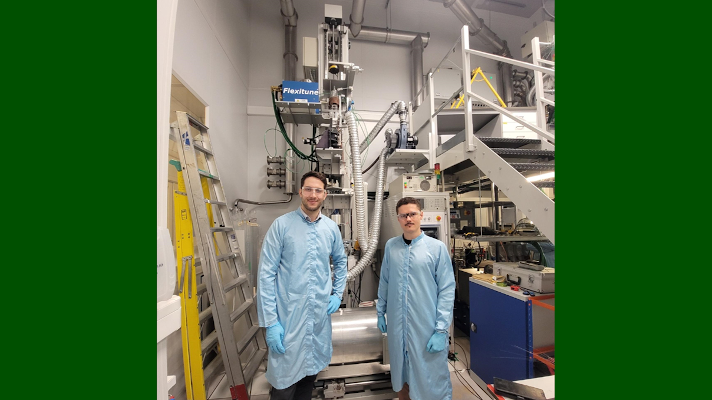
NextCOMP collaboration with University of Southampton
NextCOMP PhD student Nicolas Darras spent some time at University of Southampton recently. Pictured here with colleague Dr Bruno Moog in front of the drawing tower which manufactures glass fibres, he will collaborate with University of Southampton colleagues on the development of this machine to integrate a coating agent phase during the manufacture. It is an exciting collaboration and we look forward to sharing more as this work develops.
-
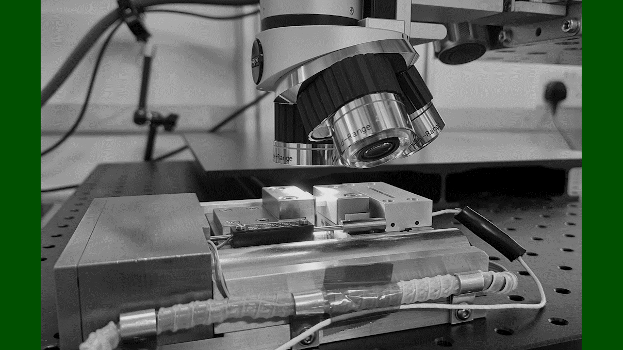
Torquato presents at CompTest 2023!
NextCOMP Team member Torquato Garulli gave an oral presentation titled: "Arresting propagating kinkbands: Failure mechanisms under longitudinal compression of carbon-boron fibre hybrids" in the first session ("Failure mechanisms") at the CompTest 2023 conference on 31st May.
The 11th International Conference on Composite Testing and Model Identification (CompTest 2023), was organised this year by the University of Girona and held in Girona, Spain held between 31st May to 2nd June 2023. It took place in the beautiful former XIII century gothic convent of Sant Domènec, located next to the Middle Ages city wall, at the old town of Girona.
Flawlessly organised, the conference was very interesting, packed with lots of attendees and was a great opportunity to network with friends and colleagues old and new with some fascinating presentations and posters.
Direct link to Torquato's abstract, slides, and presentation from CompTest 2023
The recorded event is also available on YouTube (6dgWVSbl-tU) 16:16 min
For previous Composites Testing and Model Identification Conference Series please visit CompTest.net website.
-
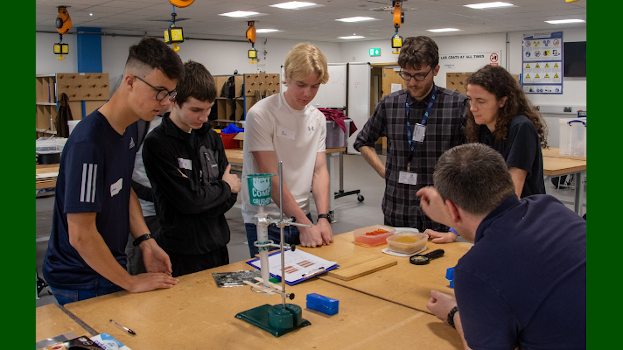
Centre for Doctoral Training student and NextCOMP Team member Ian Lee led the delivery of the NextCOMP Crusher activity at the recent very successful Advanced Composites for Innovation and Science/Composites Science, Engineering and Manufacturing (ACCIS/CoSEM) Centre for Doctoral Training Science, Technology, Engineering and Mathematics (CDT STEM) Outreach Day.
Around 50 students from Year 12 from Katharine Lady Berkeley School in Gloucester travelled to the Bristol Composites Institute on the 18th May for a full day of composites related activities. NextCOMP Co-Investigator and Centre for Doctoral Training Research Director, Prof Ian Hamerton welcomed the students before they then embarked on several interactive activities delivered by the enthusiastic Centre for Doctoral Training students which included creating an aeroplane wing, enjoying the flight simulator, pillar drilling activity and the NextCOMP Crusher activity.
It was a fantastic learning experience for both Year 12 students and Centre for Doctoral Training students alike, with both cohorts taking away new skills and experiences. We are delighted that Ian Lee volunteered his time to lead the NextCOMP activity with such energy and hugely grateful to the fantastic Centre for Doctoral Training Team and students for their hard work in putting the event together and making it such an enjoyable session.
For more details of the event please see news article on Bristol Engineering webpage and the BCI blog post about the event.
-
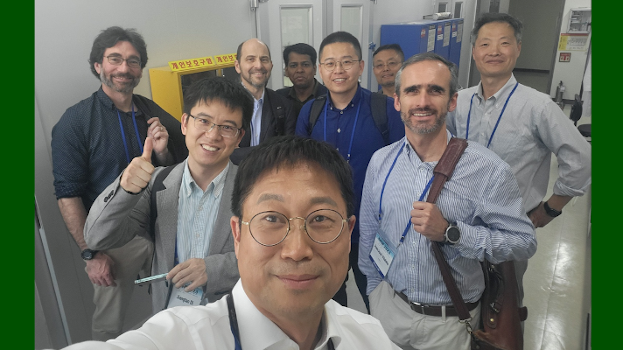
Connecting with the Carbon Nanotube Fibre community at Korean Institute of Science and Technology (KIST)!
Prof Milo Shaffer recently travelled to the Korean Institute of Science and Technology (KIST), Institute of Advanced Composite Materials which hosted the 2nd International Workshop on Multi-Functional Nanocarbon Fibers (MNF2023) between 14th to 17th May 2023. The workshop brought together experts in Carbon Nanotube Fibre research and development from across the globe during the three day period. As an invited speaker, Milo spoke on recent work on wet-spun carbon and inorganic nanotube fibres. It was a fantastic opportunity to discuss the latest in Carbon Nanotube (CNT) fibres, as well as other aspects of carbon fibre and composite development, including viewing the extensive manufacturing and characterisation facilities at KIST. CNT-based fibres are now commercially available from several suppliers and offer tension performance competitive with conventional carbon fibre.
Alongside the highly informative time at KIST, Milo was invited to visit leading carbon expert Prof Rod Ruoff at Ulsan National Institute of Science and Technology (UNIST), and met with Prof Woong-Ryeol Yu, Dean of Materials Science at Seoul National University, and leader of the Nano and Smart Composites Group, working on new carbon fibre technologies.
-
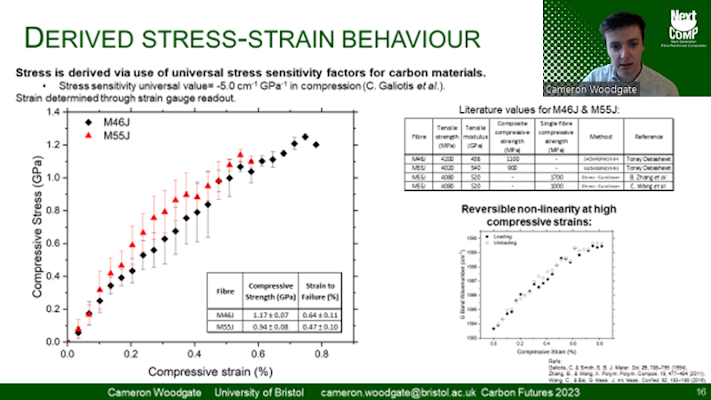
Cameron at Carbon Fibre Futures!
It was an early start for NextCOMP team member Cameron Woodgate presenting his work on "In Situ Raman Spectroscopic Characterisation of Single Carbon Fibres and their Modified Interface in Compressive Deformation" at the Carbon Fibre Futures Conference 2023 on the 9th May 2023. Presenting remotely at this conference hosted by Carbon Nexus, taking place online and in person at Deakin University, was a very enjoyable experience for Cameron who fielded some interesting questions about his research from attendees. Huge thanks to our colleagues Prof Russell Varley and Prof Luke Henderson of Deakin University and the conference team for their helping to make this happen!
-
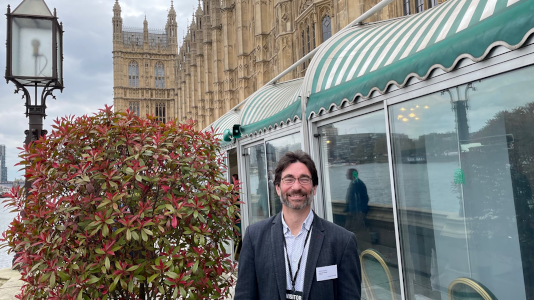
NextCOMP Team members at the Composite UK Parliamentary Reception
Prof Milo Shaffer and Prof Silvestre Pinho were delighted to attend the Composites UK: Parliamentary Reception at the Houses of Parliament on the 2nd May 2023.
It was an opportunity to hear from speakers from across the UK composites industry, the event provided a forum for an interesting exchange of knowledge and networking possibilities. A number of MPs and government officials were in attendance as well as key industry and academic stakeholders, brought together in support of the UK's Composites sector. Themes discussed included the importance of sustainability, with Composites UK CEO Dr David Bailey stating "There is no netzero without netzero in composites".
Milo commented that the event was, “A great opportunity to go behind the scenes at Parliament and talk to decision-makers at the heart of government – as well as building new connections across the UK composites industry”. We look forward to getting involved in future opportunities to engage with politicians and advocate for the composites community.
-
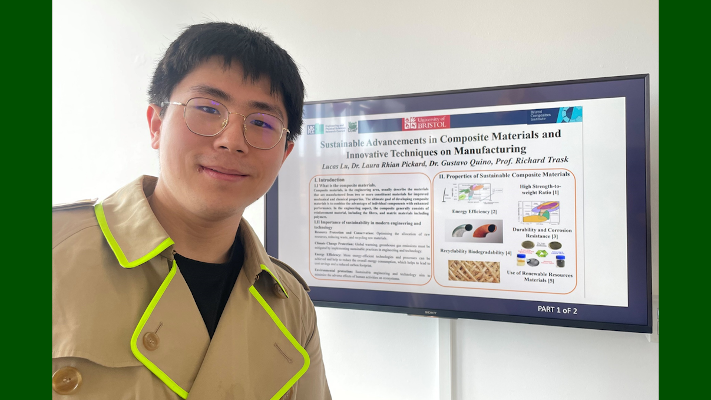
NextCOMP student intern Lucas Lu presents poster at the Bristol Institute for Learning and Teaching Student Research Festival
Undergraduate student and NextCOMP student intern Lucas Lu recently presented his poster on "Sustainable Advancements in Composite Materials and Innovative Techniques on Manufacturing" at the Student Research Festival organised by Bristol Institute for Learning and Teaching (BILT) held on the 25th April. He really enjoyed the experience and meeting the other students and the team from BILT who organised this excellent showcase of student research. Check out his poster and posters from other students at the online poster showcase here.
Lucas first started working with NextCOMP in summer 2022 as a student intern, thanks to funding via the University of Bristol Faculty of Engineering internship scheme. Supervised by Dr Laura Pickard, he has been a valued member of the team ever since, working with team members focusing on the bundle systems workstream as well as getting involved in supporting our wider activities. He has been undertaking lots of manufacturing and testing work, in particular using the Dobot as well as training our 2023 summer intern undergraduate students. Lucas will graduate this year and we are looking forward to him authoring his first paper relating to his work on NextCOMP soon.
-
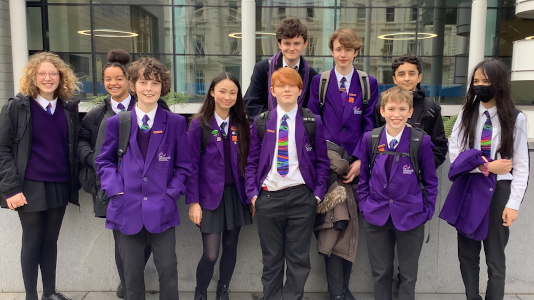
Composites activities to inspire the next generation
Prof Emile Greenhalgh, Co-Investigator in NextCOMP and colleague Dr Anjit Panesar recently delivered an exciting engagement session on site at Imperial College London with young people across a range of ages from The Norwood School.
- "As a world-leading Aeronautics Department, it is really important for us to inspire and enthuse budding engineers from London – these are the young people who will wrestle with and solve the future challenges for the UK."
- - Prof Emile Greenhalgh
Royal Academy of Engineering Chair for Emerging Technologies
Students learned about some of the incredible career opportunities in the field of aeronautical engineering, discovered more about university student life and explored some of the exciting innovations in composites research currently taking place including in NextCOMP and Structural Power. The students were enthused and excited to hear about what potential future technological developments in this area might mean for them and there were lots of questions, ideas and "wow" moments. Students were given a behind the scenes tour of the research labs which was a highlight for many, as it helped them to see for themselves some of the exciting aspects of a career in research.
One attendee commented "The testing department really excited me as you are able to test and optimise products before they go into production.” and another said, “I found it very insightful to tour the Aeronautics facilities and it really encouraged me to look further into the engineering sector and its opportunities!"
The session was very well received by all attendees. Hayley Robjant, Head of Visual Arts Faculty, and staff member accompanying the group said, “It was a wonderful opportunity for the students to learn more about STEM in action, and how this could lead to a career, both in Aeronautics and other fields... The facilities that the students got to see were fantastic, and it really showed students what and how they could be studying in the future! The presentation from staff was inspiring, and really made students think about the development of materials and how this may impact on future design. The students had a wonderful day, and we would like to say thank you once again to the team for arranging a superb visit.”
-
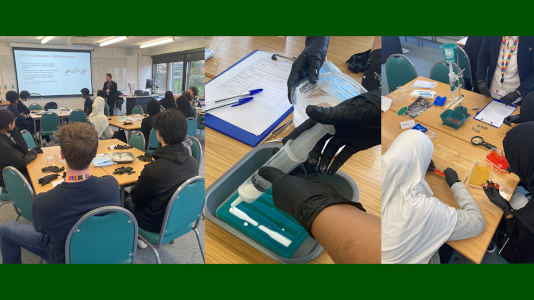
Interactive Composites Workshop for Year 12 Students!
NextCOMP recently designed and delivered a very interactive and stimulating session as part of the Access to Bristol programme. This important programme from the Widening Participation Team at University of Bristol brings together Year 12 students from a range of different local schools and diverse backgrounds and via a number of different sessions, gives them an insight into engineering at University of Bristol.
Icebreaker activities and a short talk introduced composites and their many applications. Students also learned about how we take inspiration from nature to look for and develop solutions to engineering challenges. It was a lively and interactive session. Students were able to make and test jelly/pasta composites using the popular NextCOMP Crusher kits which was a source of much amusement and learning. The session also featured our brand new activity The “NextCOMP Stretcher” which was a great success. This activity involves manufacturing a range of composites with different fibre reinforcements and testing their tensile strength in an experiment designed by NextCOMP Centre for Doctoral Training Student Ian Lee. Prof Richard Trask, Jo Gildersleve, Ian Lee, Eleni Georgiou, Nicolas Darras, Cameron Woodgate, and Rachel Board were involved in delivering the 2 h session which was very successful with excellent participant engagement.
Thanks to the Widening Participation Team, University of Bristol Engineering for giving us the opportunity to deliver this session, please refer to the Access to Bristol Programme for further details.
- "It was extremely interactive and managed to hold my attention for the whole session, which I sometimes find difficult!"
- "I loved how engaging the experiments were, really enjoyed this session."
- "The session was very interactive with lots of fun tasks regarding composites and practical's increasing tensile strength by combining a matrix and reinforcement."
- "The session was informative and has sparked [my] intrigue into the subject of composite materials."
- - Workshop Participants
-
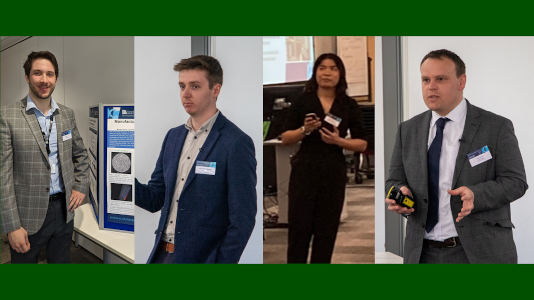
Sharing NextCOMP research at the 2023 Bristol Composites Institute Doctoral Research Symposium and Imperial College London Department of Materials Annual Postgraduate Research Day
NextCOMP student Team members were delighted to be able to present and share their research with lots of interested students, academics, and visitors at the Bristol Composites Institute Symposium on 4th April 2023. It was a very enjoyable and productive day with Aree Tongloet delivering a technical presentation, both Cameron Woodgate and Ian Lee presenting in the quickfire presentations section and Ian Lee, Nic Darras, and Eleni Georgiou displaying posters. The well-attended event (over 100 delegates from academia and industry) took place in the Bill Brown Design Suite, Queen's Building at University of Bristol and included talks from Co-Directors of Bristol Composites Institute Prof Ole Thomsen and Prof Stephen Hallett as well as from Centres for Doctoral Training Composites Science, Engineering and Manufacturing (CoSEM) Director Prof Steve Eichhorn. Presentations from across the materials, structures and manufacturing and design themes were featured.
NextCOMP collaborator Aree Tongloet gave a technical presentation on "Investigation of the Compressive Behaviour of Carbon/Glass Fibre Hybrid Composites with a 4-Point Flexural Test". Cameron presented his work on "Compressive Characterisation of Single Carbon Fibres and their Interface via in situ Raman Spectroscopy. Ian presented and displayed a poster on "Highly Aligned, Discontinuous Fibre Composites for Enhanced Compressive Performance". Nic's poster focused on "Manufacture of Struts with Carbon Fibre Reinforced Polymer Rod Reinforcements" and Eleni showed her work "Towards More Sustainable Fibre composites with Improved Compressive Performance". For further details of the event please visit the Bristol Composites Institute Doctoral Research Symposium Webpage.
At Imperial College, Charles Shaw showcased his work on silica aerogels at the Imperial College Materials Department Postgraduate Reseach Day held on the 27th March 2023.
-

A lot of Jelly and a lot of Fun as Whole Primary school Community Enjoys NextCOMP Composites Outreach Activity!
Approximately 420 schoolchildren from Westbury on Trym Primary Academy, Bristol learned some fascinating things about composites and had a lot of fun using the NextCOMP Crusher activity on the 23rd March. Designed for Key Stage 2, the activity was adapted in situ so that all schoolchildren (and their teaching staff) could enjoy it, from Reception up to Year 6.
Lead by the very proactive and enthusiastic staff at the school, following a whole school assembly introducing the activity, the children were excited to manufacture and test their jelly and pasta composites and made discoveries about composites as they did so.
Enormous thanks to the Westbury on Trym Primary Academy school community for their energy and to the children for their enthusiasm. The NextCOMP Crusher Key Stage 2 Schools Activity was developed by NextCOMP team members Eleni Georgiou (PhD student on the Centre for Doctoral Training in Composites Science, Engineering and Manufacturing) and Bohao Zhang (Post Doctoral Researcher) as part of the FUTURES festival of Discovery.
-
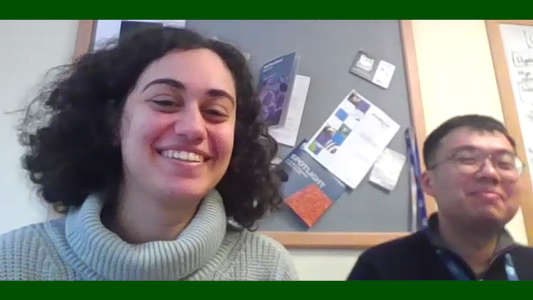
Encouraging the Next Generation of Composite Engineers!
Year 4 class: "Is it hard to become a researcher?"
Answer: "Anyone can become a researcher, the most important thing is that you enjoy what you do. I didn't think I could become a researcher, but I kept just doing the things that I enjoyed. I like creating new ideas and working on things that no one else is."Eleni Georgiou (Centre for Doctoral Training student, NextCOMP) and Bohao Zhang (Research Associate, NextCOMP) recently brought composites fun to around 90 children and their teachers from Avonmouth Primary school.
They developed a very interactive "Discover and Discuss" schools activity aimed at key stage two (KS2) children as part of the FUTURES: A Festival of Discovery, supported by the University of Bristol Public Engagement. The activity introduces composite materials and provides the materials and resources for the school children to manufacture and test their own composites made from jelly and pasta using the NextCOMP Crusher experimental set-up. This resulted in a lot of questions from the school children about jelly composites, “Do you use jelly to make any of your composites?”
The activity was undertaken by three separate classes at Avonmouth Primary school (Year 3, Year 4, and Year 5). Eleni and Bohao then had the opportunity to meet each of the classes with their teacher in three Zoom calls. The school children asked some fantastic questions and were really engaged with the topic, as well as keen to find out more about research and how to become a researcher. We were delighted to be able to deliver this activity and look forward to engaging with more schools in the forthcoming months.
- "The [pupils] thoroughly enjoyed it and I believe they learnt more about composites. Fun engaging activity that allowed the [pupils] the opportunity to use their sientific skills with equipment and resources that we would not normally be able to use."
- "he [pupils] thoroughly enjoyed it and I believe they learnt more about composites. Fun engaging activity that allowed the [pupils] the opportunity to use their sientific skills with equipment and resources that we would not normally be able to use."
- - Teacher
This activity was part of over 20 other sessions taking place with schools across the South West, where classes take part in completing science, technology, engineering, and mathematics (STEAM)-based activities from online resources researchers have designed.
For further information on ones that can be done at home please visit Futures Night: Do Try This At Home.
-
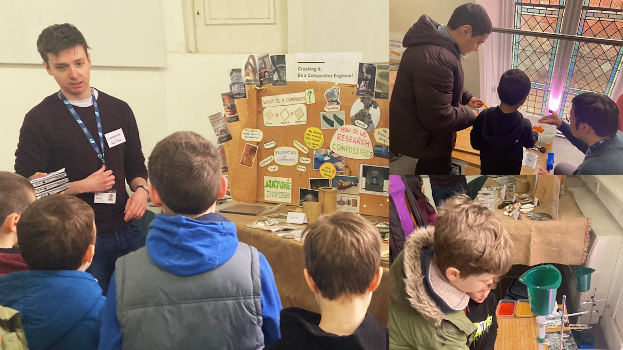
NextCOMP at Digimakers!
NextCOMP team members Cameron Woodgate, Dr Bohao Zhang, and Jo Gildersleve thoroughly enjoyed being part of "Digimakers" on Saturday 11th February 2023. A free, technology-based day-long workshop event created and delivered by Engineering students and staff from University of Bristol, Digimakers is aimed at children aged 8-13, parents, carers and educators. The event took place at the Trinity Centre and the NextCOMP team were delighted to chat throughout the day with lots of enthusiastic children and parents all about composite materials, answering their fantastic questions, showing some of the computer modelling aspects of the project and some of the ways our work is inspired by nature. Our NextCOMP Crusher activity was really popular with parents and children alike who enjoyed making, testing and breaking their own composite materials using jelly and pasta! Huge thanks for the fantastic organisation of the event by University of Bristol School of Computer Science, Electrical and Electronic Engineering, and Engineering Maths (SCEEM) outreach colleagues a really great day which we thoroughly enjoyed!
-
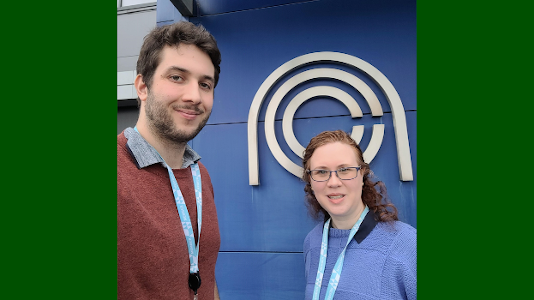
Settling in: Nicolas Darras
Since starting on NextCOMP in October 2022 our new PhD student Nicolas Darras based in Bristol, (pictured above with Dr Laura Rhian Pickard from his supervisory team) has been a regular visitor to use the state-of-the-art manufacturing facilities at our partner National Composites Centre (NCC). So far, Nic has been gaining valuable experience learning the ropes and manufacturing composite struts using a novel resin injection methodology. The ongoing collaboration with the NCC team is really adding value to his initial experimental research and we are looking forward to sharing more as his PhD progresses.
-
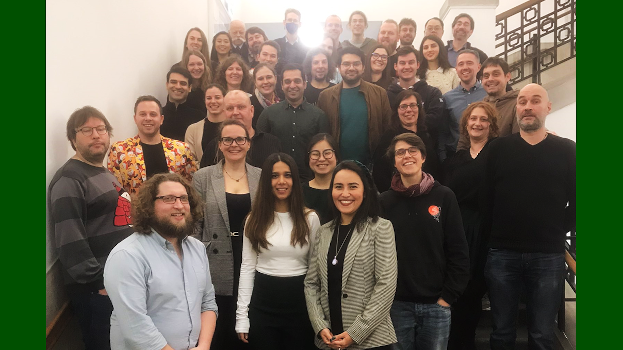
NextCOMP at 7th International PaCE X-mas Symposium
Professor Milo Shaffer and Dr David Anthony were delighted to be invited to speak the 7th International Polymer & Composites Engineering (PaCE) Group X-mas Symposium in Vienna which was on the 21th December 2022, and hosted by Professor Alexander Bismarck. It was a great day full of diverse and interesting talks, with Milo discussing “Nanocarbon reduction: Versatile chemistry, assembly and application” and David discussing “Improving fibre-reinforced composites in compression with hierarchical continuous 3D reinforcement”.
For more details on our collaborators at PaCE follow them on Twitter @IMCRUnivie and they are members of the Institute of Materials Chemistry & Research, are based at the University of Vienna.
-
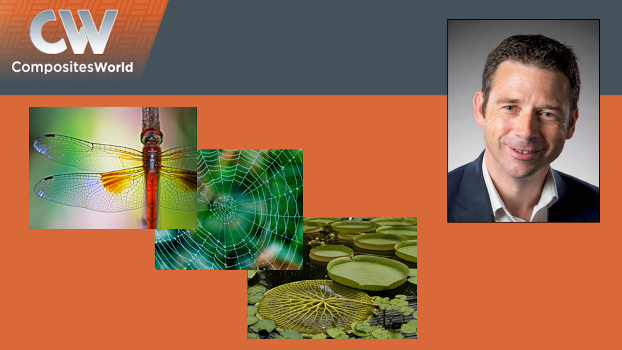
Photo: Credit Getty Images
Designing for biomimetic composites with Prof Richard Trask
We are delighted to announce the release of the follow up article Drawing design cues from nature: Designing for biomimetic composites, Part 2 by Grace Nehls, in Composites World which Professor Richard Trask contributed towards. Read all about composite processing and the manufacturing of composites and their potential for making bio-inspired structures.
Composites World\Processes\Filament Winding, published 12th Decemeber 2022
-
Dr Francisca Martínez Hergueta "Impact Response of Automated Fibre Placement Advanced Placed Ply Composites: An Experimental and Numerical Study"
Abstract: Low velocity impact tolerance is a major concern in the design of critical aerospace structures. Conventional composites consisting of laminated unidirectional plies possess poor impact tolerance, due to the propensity of their constituent plies to delaminate when subjected to dynamic out-of-plane loading. The resultant damage can significantly affect the residual strength of a composite. Alternative laminate architectures, e.g. 3D-wovens, non-crimp fabrics, and z-pinned composites, contain through thickness reinforcements which improve their out-of-plane response. However, the fiber crimp and fiber breakage introduced during the manufacture of these composites negatively impact their undamaged in-plane mechanical properties. A novel preform method known as Advanced Placed Ply preforming (AP-PLY) makes use of Automated Fiber Placement (AFP) technology to produce quasi-woven composites. AP-PLY laminates are more impact tolerant than conventional angle-ply composites, but retain the latter's excellent in-plane strength and stiffness.
We would like to thank Francisca once more for the lecture given on 2nd November 2022 which was well received by all those who attended.
The recorded event is available on YouTube (5zhM6XFrDQ4) 40:45 min
-
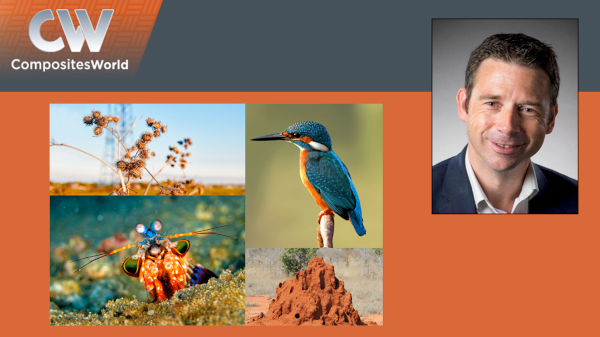
Photo: Credit Getty Images
Drawing design cues from nature with Prof Richard Trask
We are delighted to announce the release of an article Drawing design cues from nature: Designing for biomimetic composites, Part 1 by Grace Nehls, in Composites World which Professor Richard Trask contributed towards. Read all about biomimetic composites and how we are seeking inspiration from nature in the NextCOMP Programme to improve compression performance of composite materials.
Composites World\Processes\ATL/AFP\Additive Manufacturing, published 19th October 2022
-
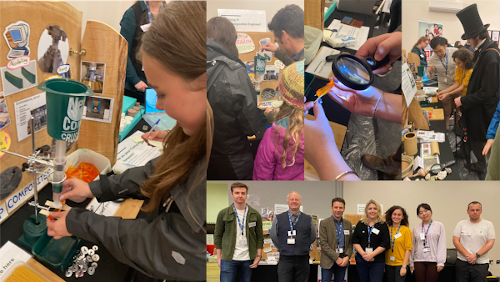
Composite "Crushing it" at Up late on the SS Great Britain, FUTURES European Researchers Night
The NextCOMP Team and BCI collaborators enjoyed an extremely fun and busy evening on Friday 30th September 2022 at Up late on the SS Great Britain, one of the events held as part of FUTURES organised by the University of Bristol Public Engagement Team. Despite the weather this was a very well-supported event at the Bristol harbourside and our stand "Crushing it: Be a Composites Engineer" was very popular with visitors of all ages including Brunel and Prof Evelyn Welch, Vice Chancellor. Visitors were eager to watch our DOBOT demonstrations as well as to have the chance to manufacture, test, and inspect their own jelly and pasta composites using the brand new "NextCOMP Crusher". We loved chatting to all the visitors about our research and hearing their thoughts about what we are doing!
-
Professor Russell Varley "From precursor to the composite: How new carbon fibre and its composites will contribute to a more sustainable future"
The 2022 NextCOMP Annual Lecture was delivered by Professor Russell Varley on 3rd August 2022, who is part of the Leadership Team at Carbon Nexus and an invited Academic Partner with NextCOMP. Carbon Nexus works across the entire carbon fibre value chain, from spinning the precursor to producing carbon fibre tow, and of course, the carbon fibre composite. Carbon Nexus' mission is to work at the intersection of academia and industry to better understand the science and engineering of carbon fibre production and to work with industry partners to transition research into reality. This talk introduces the Carbon Nexus research facility and describes in detail the carbon fibre production process from the precursor to the carbon fibre, with specific emphasis upon the requirements for improved compression. Highlights of Carbon Nexus' recent achievements in developing a new generation of carbon fibre and its composite materials is discussed and importantly how they will contribute to creating a more sustainable future.
We would like to thank Russell once more for the lecture which was well received by all those who attended in-person and virtually.
The recorded event is available on YouTube (ihprZsUsrww) 54:44 min
-
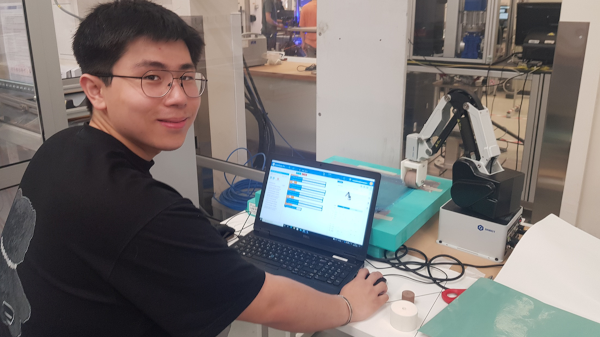
-
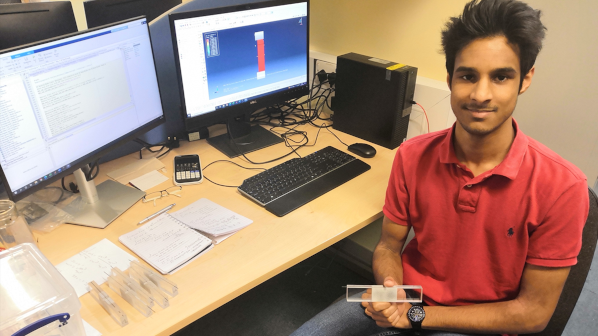
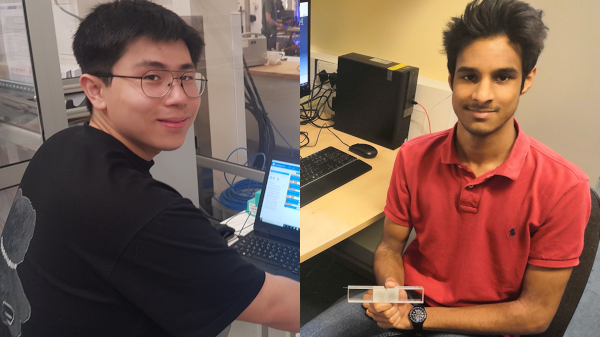
-
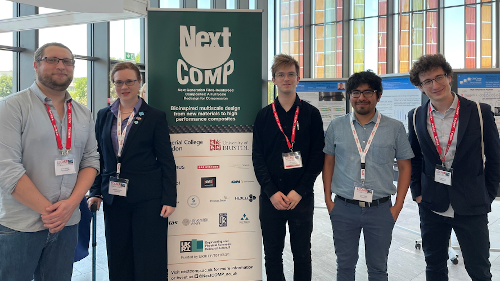
NextCOMP researchers and Dr Soraia Pimenta at ECCM20
The NextCOMP Programme was well represented at the 20th European Conference on Composite Materials (ECCM20) which was held in Lausanne, Switzerland between 26th - 30th June 2022 with talks given by researchers Dr Laura Pickard on “Manufacturing Advances for Pultruded Rod Based Structural Members and Thick Ply Systems” (second on the left), Dr Gustavo Quispe on “Design of a bending experiment for mechanical characterisation of pultruded rods under compression” (second on the right), and Dr Torquato Garulli on “A novel bio-inspired microstructure for progressive compressive failure in multidirectional composite laminates” (right). Posters were given by Dr David Anthony on “Hierarchical solutions to compressive problems in fibre-reinforced composites” (left) and Mr Charles Shaw on “Designing Bicontinuous Silica-Epoxy Nanocomposites” (centre).
It was a stimulating conference and great to see everyone in person after so long.
Congratulations to Dr Soraia Pimenta who delivered the Thursday Keynote on "Hierarchical scaling laws for strength, durability and damage tolerance: Applications across the life-cycle" which was well received by all. Soraia was also part of the panel discussion on life cycle analysis (LCA) of carbon fibres which was addressing the conference theme “Composites meet Sustainability”.
-
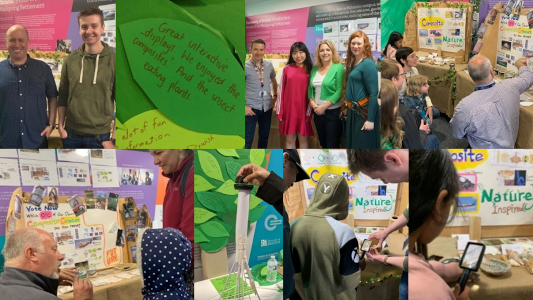
Festival of Nature with the NextCOMP Team and Bristol Composites Institute
Members of the NextCOMP Programme Grant Team and Bristol Composites Institute enjoyed a fantastic day engaging with the public about their composites research as part of the very popular Festival of Nature on Saturday 18th June 2022. The event took place at Barton Hill Microcampus and was a brilliant opportunity for exchanging ideas with families from the local community. Conversations were focused on naturally occurring composites found in seashells, wood, cork, bamboo and living creatures and how these are inspiring future materials development. The composites timeline showed how the use of artificial composites has grown and changed our world through the ages, which prompted great conversations about how we use composites today and what we should use tomorrow. Several interactive activities were included on the stand ranging from hands-on exploration of the different concepts to a paper straw-structure building challenge. Visitors also voted for their favourite "Composite creature" in which the mantis shrimp emerged victorious after a hotly contested battle with the armadillo.
Thanks to the Festival of Nature and our Public Engagement team at University of Bristol for a thoroughly enjoyable and successful day. We are already planning for our next opportunity to engage with our local communities in the forthcoming months so watch this space!
-
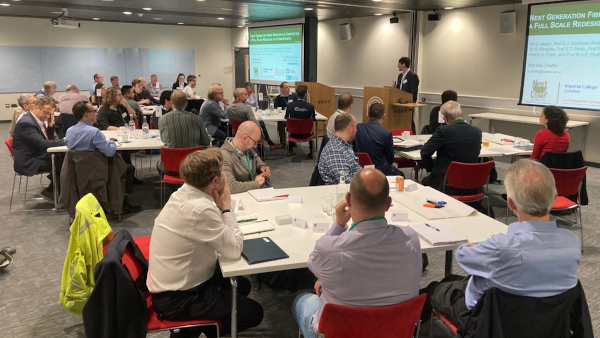
-
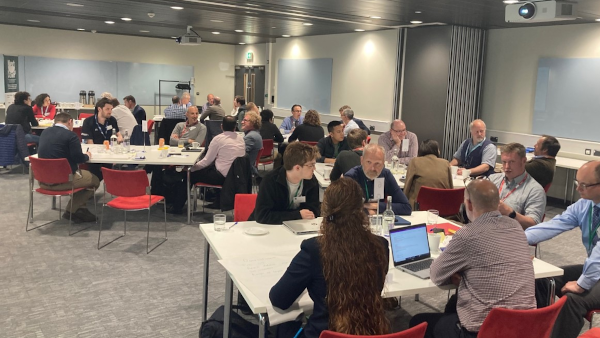
-
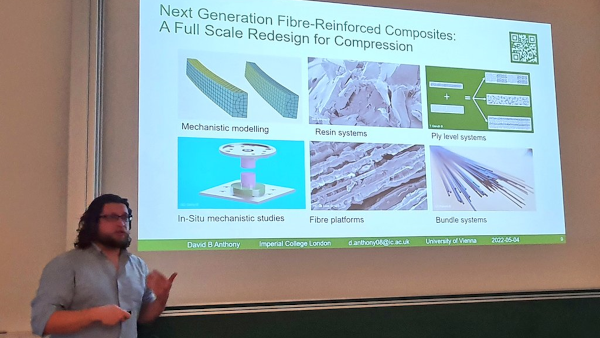
NextCOMP researcher Dr David B Anthony invited to speak at the University of Vienna
Dave visited Prof Alexander Bismarck and Assistant Prof Robert Woodward and the Polymer and Composites Engineering (PaCE) Group at the Institute of Materials Chemistry, University of Vienna on the 5th May 2022, presenting his work on hierarchical fibre synthesis. The work highlighted the close ties between the two universities and the on-going collaboration to increase the production of carbon nanotube-grafted carbon fibres.
-
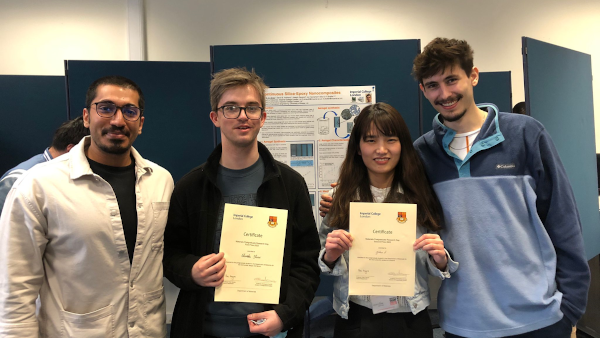
NextCOMP researcher Mr Charles Shaw won the best poster at the Imperial College London Materials Department Postgraduate Day
Charlie (second from left) was awarded the poster prize on the 28th March 2022 for his work on matrix materials as part of the NextCOMP Team. Congratulations Charlie!
-
NextCOMP researcher Dr Laura Rhian Pickard features in a video series launched by Bristol Composites Institute 7th February 2022
Laura's film explains how, in NextCOMP, we are taking inspiration from naturally occurring hierarchical composites to design a new generation of composites which will perform better in compression. The video Pressing Matters: Designing the next Generation of Composite Materials is available on YouTube (i20NEQ8luDA) 1:51.
-
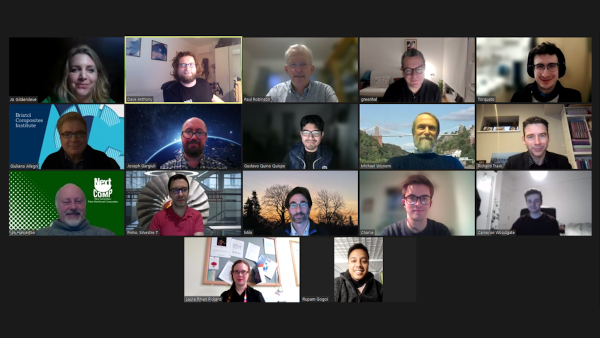
Propagation of Compressive Failure NextCOMP Workshop
The Propagation of Compressive Failure Workshop, took place online on the 12th January 2022, the NextCOMP team considered the propagation of damage in compression of continuous fibre reinforced unidirectional composites and the effect of the overall system scale and architecture for these processes. The discussions were stimulating, and the breakout sessions focused around the challenges and how the NextCOMP strategies could tackle these mechanisms.
-
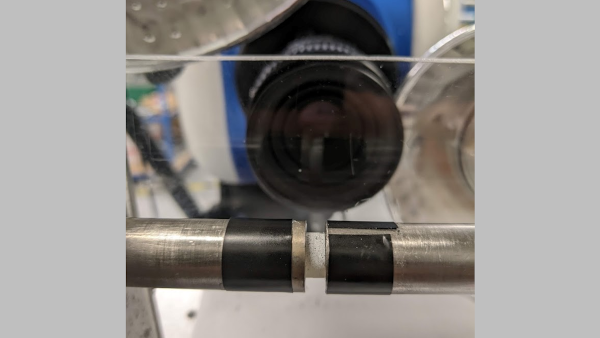
Dr Gustavo Quino conducts impact experiments at the University of Oxford
NextCOMP team member Gustavo visited University of Oxford in February 2022 to undertake experiments which will help us to understand the effects of dynamic loads (impact) upon the mechanical behaviour of matrix materials. During the experiments, an ultra-high-speed imaging system was used to take photos of the deforming specimen at a rate of 500000 frames per second! These photographs will provide detailed information on the strain history during the experiment, which takes place within under 500 microseconds.
-
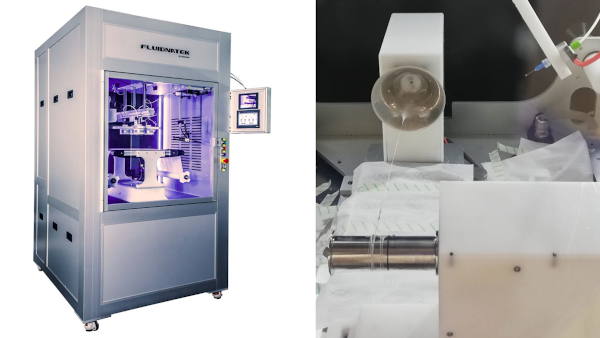
NextCOMP's Cameron Woodgate visits the Henry Royce Institute to learn about state-of-the-art electrospinning
On the 25th October 2021, NextCOMP PhD researcher Cameron Woodgate went to the Henry Royce Institute in Manchester to see the new facilities & state-of-the-art electrospinning equipment used by Dr Jonny Blaker and his group. During the trip, exchange of electrospinning knowledge, processes, and experimental setups was carried out, along with practical demonstrations of the Bioinicia Fluidnatek LE-500 electrospinning equipment; and discussion of its potential to be utilised to produce novel material systems to be used with fibre reinforced composites in the NextCOMP project.
-
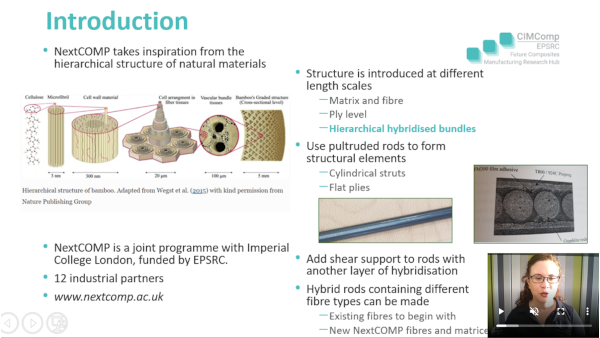
Dr Laura Rhian Pickard delivered a quickfire presentation at the virtual EPSRC Future Composites Manufacturing Research Hub Open Day
The event held vitually on the 19th October 2021, was attended by ~200 students, academics, and industry representatives, her talk was very well received and served to introduce NextCOMP to the wider Composites Community. The presentation showed how NextCOMP is inspired by the hierarchical structure of natural composites before focusing on pultruded rod based structures.
CIMComp EPSRC Future Composites Manufacturing Reseach Hub
EPSRC Future Composites Manufacturing Research Hub Open Day 19th October 2021
-
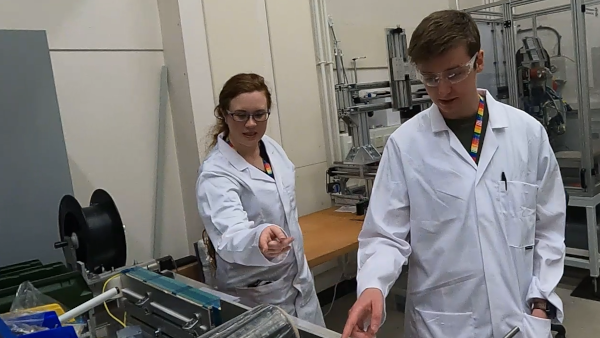
NextCOMP Bristol researchers create film for Bristol Composites Institute Annual Conference 2021 to be held on the 9th November 2021
The NextCOMP University of Bristol team members have created a film giving an overview of the project and some of their research. Attendees of the BCI Annual Conference 2021 will be able to discuss the research with the NextCOMP team at a dedicated interactive session during the event. It is an excellent opportunity for industry and academics to find out more about NextCOMP from our researchers.
BCI Annual Conference 2021 "Composites for Future Resilience"
BCI members on "NextCOMP: A full scale redesign for compression" YouTube (H1_vaMl0Mjc) 4:14 min
-
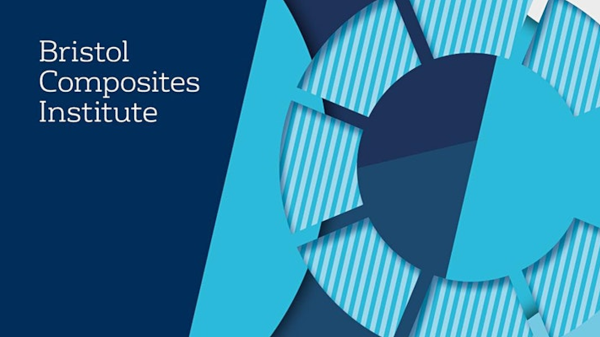
NextCOMP features in BCI new student and staff induction talks
New students and staff of the Bristol Composites Institute learned about the NextCOMP programme grant in their induction talks in late September 2021. University of Bristol NextCOMP Principal Investigator Professor Richard Trask talked about the research areas NextCOMP focuses on and other NextCOMP team members gave presentations to the new cohort with space at the end for questions.
-
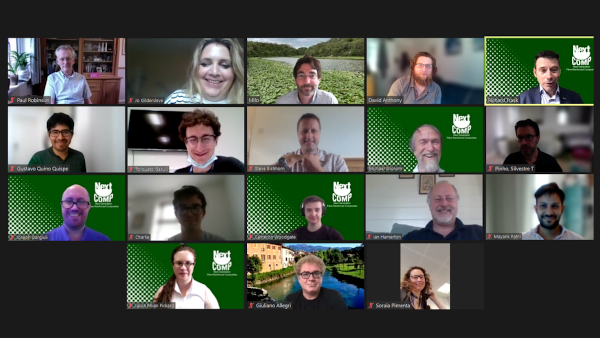
Initiation of Damage NextCOMP Workshop
The Initiation of Damage Workshop, took place online on the 10th September 2021, and provided a framework for the NextCOMP team to explore and discuss different ideas and concepts surrounding the initiation of damage in compression of continuous fibre reinforced unidirectional composites. Interactive breakout discussion groups focused first around N. A. Fleck's damage mode map (“Compressive Failure of Fiber Composites", in Advances in Applied Mechanics, Vol. 33, No. C, 1997, pp. 43–117) and ultimately led to discussion about research areas and mechanisms to focus on.
-
Professor Veronique Michaud Lecture: Composites for a More Sustainable Future... Tough, Healable, Recyclable?
The inaugural NextCOMP Annual Lecture was delivered by Professor Veronique Michaud on 8th July 2021, who is a member of the External Advisory Board for NextCOMP. She has many years of experience in composites and elevating research ideas into commercial products. The lecture was held virtually with ~70 attendees from around the world, the talk was informative and enjoyed by all with an insightful questions and answers session at the end.
The recorded event is available on YouTube (yYq4hQwG5AI) 43:45 min
NextCOMP were delighted to host two summer 2022 interns at University of Bristol with thanks to funding from the Faculty of Engineering Summer Internship Scheme
Supervised by Dr Laura Pickard, Lucas Lu worked on a project entitled Human Robot Collaboration Layup of Pultruded Rod Based Composites. In this project Lucas explored several methodologies for manufacturing the composites. Prof Nathan Lepora of Bristol Robotics Lab kindly loaned us the DOBOT MG400 which Lucas used to test his manufacturing methodologies.
Supervised by Dr Gustavo Quino, Harshul Jolly undertook a project entitled Simulation and Practical Testing of Pultruded Systems for Improved Compressive Performance; in which he learned modelling techniques, and simulated different geometric parameters in one of the experimental set ups currently being used for composite compression testing. Harshul also conducted experiments for one of the configurations in the Bristol Composite Institute lab.
It was a pleasure to host these two fantastic students, both of whom made some really interesting and useful discoveries throughout their internships, with their work having clearly highlighted next steps for future development. They told us that they really enjoyed working on their projects, which they said had enabled them to really accelerate their learning and develop lots of different skills, including, for example writing risk assessments, devising workplans, as well as in improving their presentation skills for their final presentations to the wider NextCOMP Team.
"It is a truly wonderful experience working with NextCOMP this summer. I have learned a lot!"
“I strongly believe this project has taught me a lot, and I will most certainly continue to use the lessons I have learned here throughout my career.”
NextCOMP Industry workshop
On Tuesday 7th June 2022 approx. 40 attendees from industry and academia met at the National Composites Centre (NCC) for the NextCOMP Industry workshop. This was an opportunity for NextCOMP industry partners to engage with the research team to hear about the research and to help define the future NextCOMP research activities.
Following an introduction and overview of the project by Prof Milo Shaffer, the first session focused on ‘Initiation of compression failure of Unidirectional composite materials’. Prof Richard Trask introduced and discussed the role of ‘damage maps for initiation of compression failure in composites’ followed by a further presentation (on behalf of Dr Soraia Pimenta) on ‘critical parameters for compression strength’. In the second session, Prof Emile Greenhalgh gave an insightful presentation on ‘propagation of compressive failure in multi-directional composite materials’ and the new challenges different stacking sequences present in initiating and containing manufacturing defects and operational damage when loaded in compression. After lunch, the final session focused on Industrial technology requirements, where the attendees were tasked to discuss and feedback on specific questions arising around how the new NextCOMP materials and design concepts could be applied to solve the challenges of today’s composite components.
The workshop was deemed a success by the NextCOMP team permitting the researchers to showcase their current project results and future ideas whilst also gaining first-hand experience of understanding and interacting with the UK’s leading composite industrial partners. Attendees reported that the workshop was useful and engaging, and an excellent opportunity to collectively debate the key questions and to gain knowledge. When asked what the most valuable aspect of the workshop had been, one industry attendee commented "Discussing the programme with others. Not only does this make a better programme, but I learned a lot."
